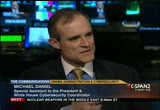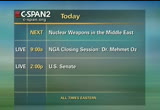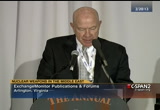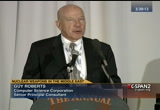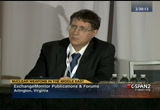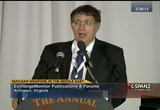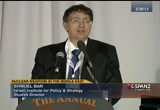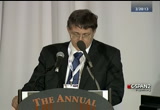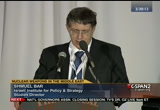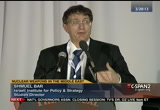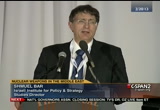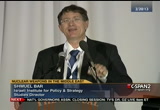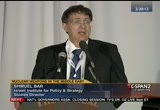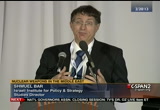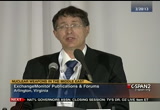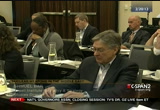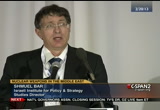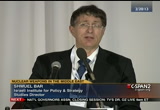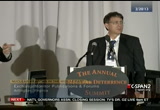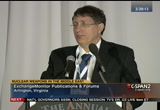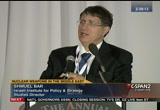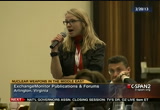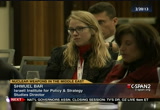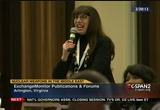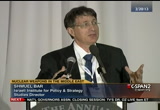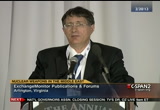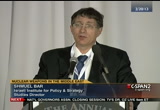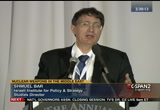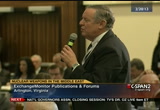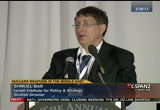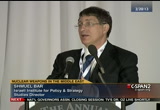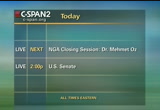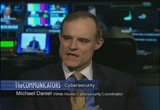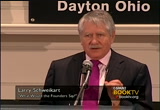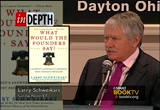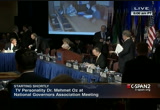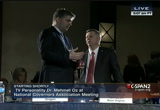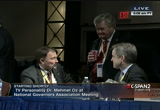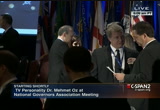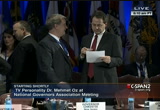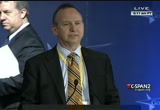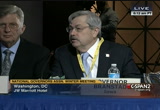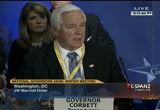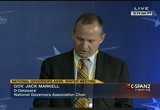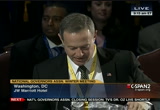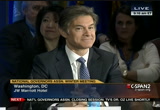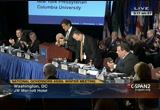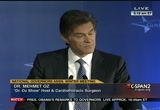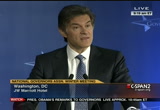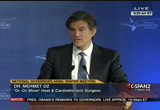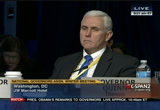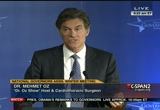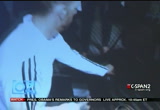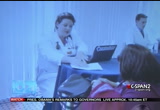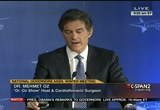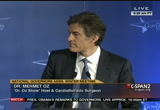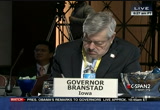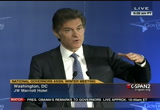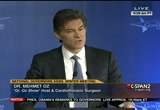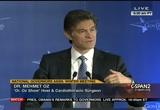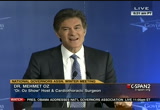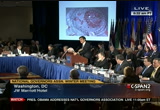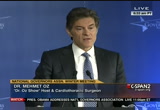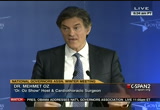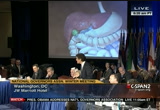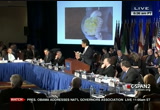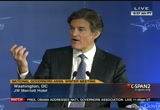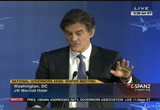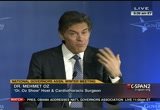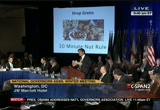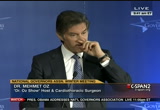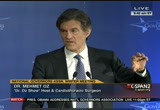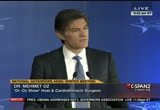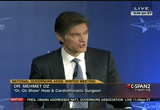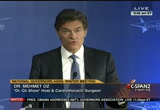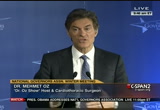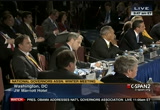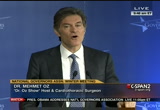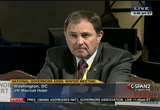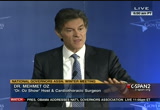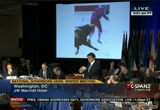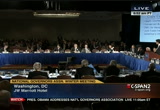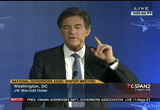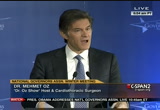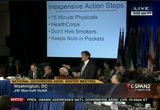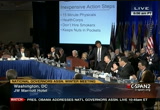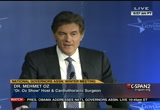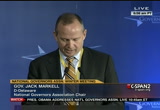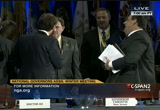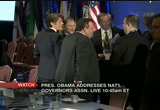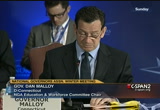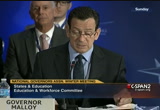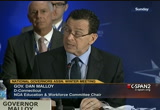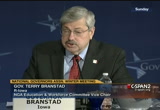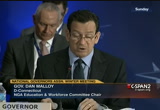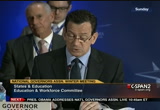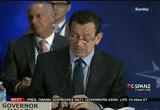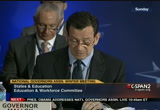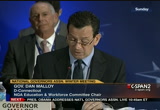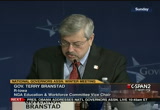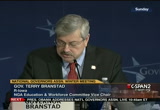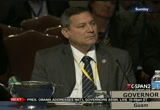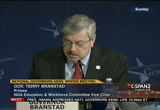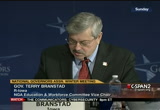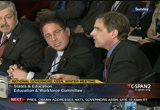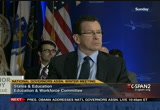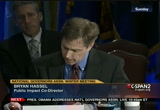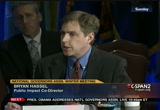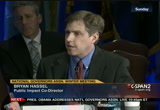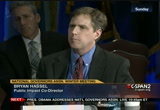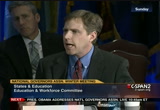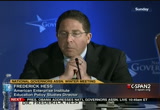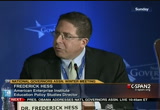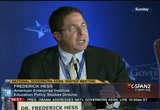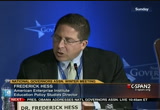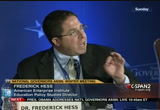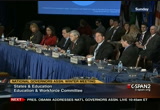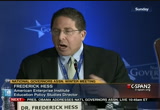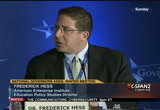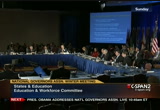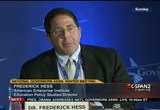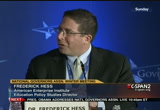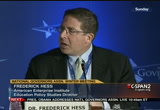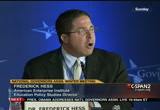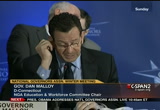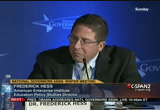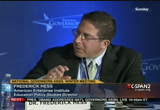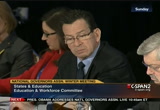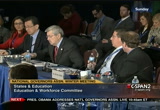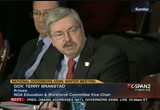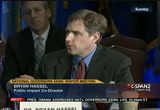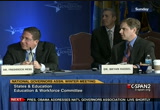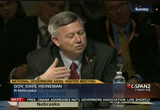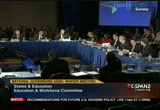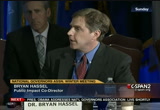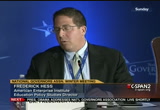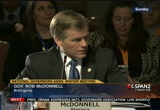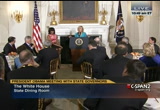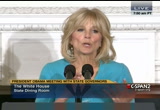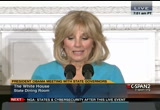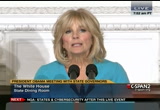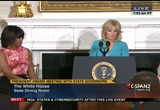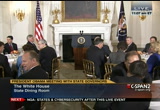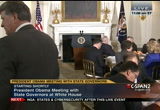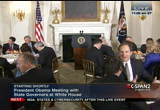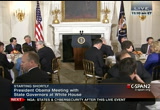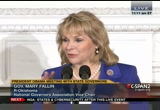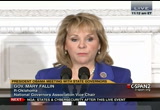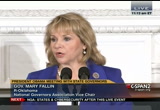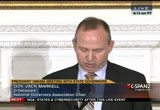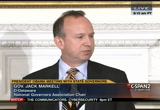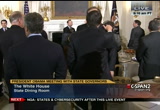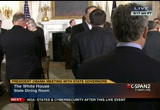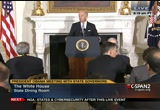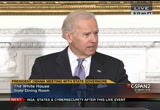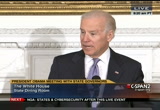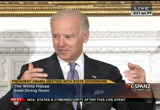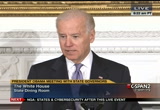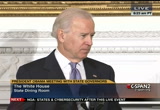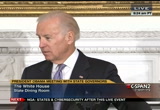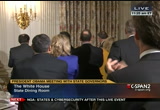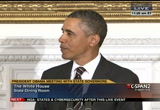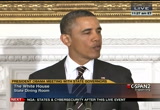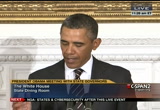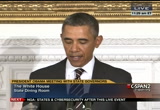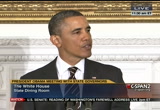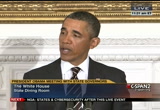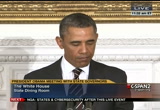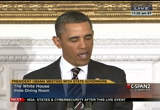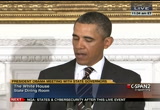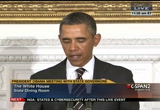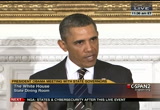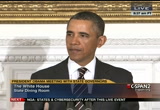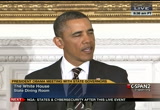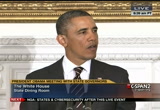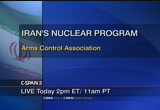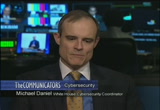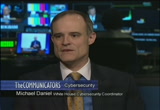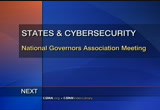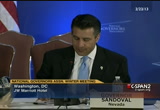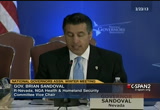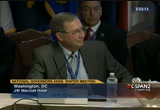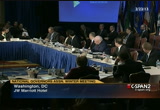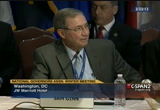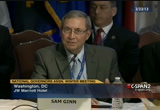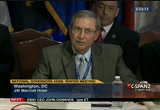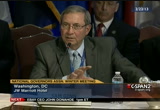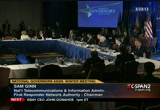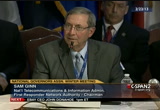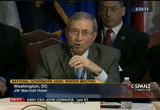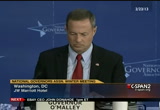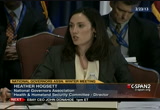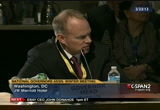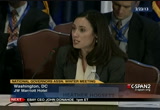tv U.S. Senate CSPAN February 25, 2013 8:30am-12:00pm EST
8:30 am
the directions, government to industry, industry back to government, among companies in a given industry to really make sure that we all have a good sense of what the threat environment really is like and what's really happening there. um, and then that will put us in a much percent place to actually try to tackle the long-term, more persistent threats and allow us to focus our resources on those. >> host: michael daniel is the cybersecurity coordinator for the white house. gautham nagesh is the editor of technology executive briefing. this is "the communicators" on c-span. >> coming up next, a discussion about nuclear weapons in the middle east and the decrease of u.s. influence in the region. then in about half an hour we're live with the closing session of the national governors' association's annual winter meeting as tv's dr. oz speaks to the group on government responsibility for the personal wellbeing of its citizens. and later the senate returns at 2 p.m. eastern following its
8:31 am
weeklong presidents' day recess when new hampshire senator, kelly ayotte, delivers the annual reading of president george washington's 1796 of farewell address. also today on the c pan networks, the bipartisan policy center's housing commission releases its recommendations for future federal policy. it's expected to address summits including -- subjects including housing finance and affordable rent. the report is being released by former senate majority leader george mitchell, former hud secretaries mel martinez and henry cisneros, and former missouri governor and senator kit bond. live coverage from the newseum in washington begins at 11 a.m. eastern over on c-span. >> on route 66, you know, people were traveling, east traveling for -- either traveling for fun or looking for a job, maybe they were on their way to the grand canyon, maybe they were on their way to work in the agricultural fields in california.
8:32 am
so at first route 66 was just a way to get somewhere. i mean, your destination was out in california. but later on after all these snake pits started bros. responsibling up and all these tourist traps and attractions and the cafés and the motels and the trading posts, indian trading posts, when those things started springing up, it almost became like a big amusement park along route 66, and route 66 became the destination. it was not like, dad, can we go to the beach in california? it was more like, dad, let's go down route 66, because all the fun stuff is there. it's like a big, long amusement park. >> can get your kicks on route 66 in albuquerque, new mexico. one of the places you'll see this weekend as booktv, american history tv and c-span's local content vehicles look behind the scenes at the history and literary life in albuquerque march 2nd and 3rd on c-span2 and 3. >> a discussion now on nuclear
8:33 am
proliferation in the middle east. you'll hear from israeli professor shmuel bar who says hopes for a nuclear-free middle east are unrealistic givenning what's happened in iran. he warned that nuclear proliferation could lead to a similar problem in asia as countries begin to rely less on america's ability to project a nuclear deterrent. he spoke at a conference on nuclear weapons hosted by exchanging upon to have publications and forums -- monitor publications and forums in washington. >> it's a pleasure to be here. i like how you introduce the moderator to introduce the speaker. that's a good way to go. [laughter] well, it is a pleasure to be here, and i think that our topic is a very timely one, one in which, again, there's probably no other area in the world more unstable and more of a concern with regard to the proliferation of weapons of mass destruction.
8:34 am
in fact, indeed, it's often called the arc of instability in that region because of that. and, obviously, one of our focuses is on iran despite the fact that they've been subject to numerous sanctions in the u.n. security council, numerous resolutions from the international atomic agency, they continue to embark on this effort to acquire a nuclear capability. and despite, also, the fact that we've had a long history, over 30 years, of efforts to create either a middle east nuclear weapon-free zone or a middle east weapons of mass destruction-free zone, those efforts as disrm amount initiatives to, frankly, charitably have been called a total failure despite the nbt review conference's effort to have a middle east nuclear weapon-free zone conference last year. no one was able to agree, again,
8:35 am
given the instability in the region, the arab spring process phenomenon and other things. so if question don't have disarm -- if we don't have disarmament efforts that will work, if we don't have any efforts at trying to stop a country from acquiring a nuclear weapons capability, what's left? and i think what's left is maybe a deterrence posture which dr. shmuel bar will address you. very briefly, dr. bar is director of studies at the institute of policy and strategy in israel. he served for over 30 years first in the idf intelligence and then in the analytical positions office of the prime minister, and he's published on issues exespecially thively relating -- extensively relating to the middle east. so without further ado, dr. bar. [applause] >> i apologize for not having any slides. thank you very much for the
8:36 am
invitation. first of all, so the question that i'm going to address is multilateral nuclear defense feasible, and particularly, is it feasible in what seems to be inevitable which is a polynuclear middle east. so shortly my answer, i won't keep you in suspense. probably not. any questions? [laughter] good. so now i will seriously address it because this is something which i personally have been involve inside counterproliferation efforts for decades, and sadly, we have reached the point where apparently we are entering a new sphere. so, first of all, we have to understand when we say nuclear do tenderness we tend to be dawn -- deterrence, we tend to be drawn back to the paradigm of the cold war, and i would like to explain why the cold war deterrence paradigm is, actually, completely invalid to, in the context of what we're going to see in the middle east. nuclear deterrence between the
8:37 am
two superpowers during the cold war was based on a number of features; second-strike capability which both superpowers held, highly responsive and robust command and control and intelligence capabilities, very accurate intelligence, satellite intelligence and secondary intelligence regarding the intentions and the capabilities of the other side which could alleviate concerns a, effective bilateral communications between the two countries, minimal public intervention which intervened in the management of the nuclear relations. most of the nuclear alert and crises which actually did take place during the cold war, the public in both countries actually never knew about it until after the cold war. a common base of rationality.
8:38 am
in other words, nuclear deterrence we can liken it in terms of a dance. it's more like a very professional tango. it's not a free-for-all folk dance. you have to be extremely professional, and the prerequisites for nuclear deterrence in this context are now we have to address them and ask will they exist in a mull by lateral, polynuclear region. so, first of all, many people will invoke the rational actor model. as a historian by education, i would like to say that this is a can custom which is more honored in the breach than in the observance and the rational actor model, had it opinion really relevant and really true, then most of what we know as history probably would never have happened. and i don't think that if we just -- everybody takes a look at his history lessons, and he'll understand that. then we have the argument which is taken to extreme by kenneth walz who argued that, actually, nuclear weapons make countries
8:39 am
responsible. so once they get the nuclear weapons, then some sense of responsibility descends from heavens, oh, my god, look what i've got in my hands, and i've got toen responsible. -- to be responsible. if you were talking about the reduction of nuclear weapons, then i would suggest the united states to sell its nuclear weapons to every country in the world. you will get revenue, and you will make all the cups responsible, and it will be peace on earth and goodwill towards men. but seriously, i don't think anybody's contemplating that, so apparently we do not believe in the rational actor model. and i would like to quote somebody with far more experience in nuclear a con b flicks than i have, mcnamara, who said that kennedy was rational, khrushchev was rational, custer was rational. rational individuals came that close to total destruction of their societies. so let's remember that. so the question isn't, actually, deterrence or static deterrence, the question is the behavior of
8:40 am
the various actors in kinetic situations and escalation, control of escalation processes. and far too much has been focused on deterrence as a static process, and much too little on escalation and the dynamics of escalation in various contexts. so, first of all, the chances of averting a polynuclear middle east, i raised a question regarding confidence. i, personally, from my experience in the middle east i think that america -- the confidence in an american nuclear deterrence b towards a potential run yang nuclear threat to the countries of the middle east, in other words, confidence that the american extended deterrence is enough to prevent other countries from going nuclear is actually at the lowest level that it could be. there is no such confidence. i think that it's almost a bygone conclusion that when iran is perceived as coming finally
8:41 am
close to a nuclear capability, a military nuclear capability then saudi arabia, turkey, egypt and other countries will move forward. this will, of course, raise the question of israel's nuclear posture, um, which according to foreign press israel seems to have. i don't know about that, of course. attitudes towards nuclear weapons are going to be critical. now, we tend to see nuclear weapons as something devastating, something totally last resort. but is this the way that people in the middle east are going to see it? now, if we read the discussions in circles of islamic scholars who have very theoretically raised the question of nuclear weapons, then they try to find some sort of similarly to what -- zimmlys to what nuclear weapons are. it's like ancient catapults because it's indiscriminate
8:42 am
killing, and in the old days you'd throw a rock over the walls of the city, and you didn't see who you killed. if the prophet muhammad used catapults, that means if he lived today, he would use nuclear weapons. people tend to say, oh, that's just religion, people are rational. which isn't quite true. religious fault lines in the middle east are critical. i think once iran goes nuclear, i think we're going to have a severe shia/sunni fortnight, threatening the sunni dominance in the world -- in the middle east. we will probably see very close to that a pakistani, a nuclear presence, a pakistani-extended deterrence in saudi arabia. the saudis finance the pakistani nuclear program. they have a prior agreement with them that if saudi arabia calls for it, they will provide them with nuclear weapons.
8:43 am
i doubt that the pakistanis will just deliver a bomb. they would probably station elements in the region, and this would, is going to raise a question regarding for the first time a pakistani second-strike capability against india which would certainly complicate the south asian complex. escalation and risk proclivity in the middle east are far high or than they ever were between the two superpowers, but i think that the main problem here is command and control. we have to address the question of how command and control of nuclear weapons are, influences deterrence. so, first of all, questions of custody. in the united states, it's accepted that the military people who have access to nuclear weapons go through some sort of security clearance. we trust them. this is the way that most of the western countries -- israel,
8:44 am
certainly -- has vetting procedures. but in most of the countries in the middle's, you will not provide your strategic weapons to anybody whon't your tribesman -- who isn't your tribesman, your cousin. so in other words, there will be a concentration of capabilities, both delivery capabilities, r&d and weapons in the hands of very small groups. the authority for use, can anybody imagine an american-style football or an american-style authorization process in a country where you have a supreme leader who is directly connected to allah and would khamenei or any supreme leader allow a president, an elected president to have any influence over his decision to use strategic weapons? i doubt it. it just doesn't fit into the paradigm of the regime. we also have to recall that command and control is very
8:45 am
heavily culturally influenced. we know that today that american paradigms of command and control, french paradigms and certainly russian paradigms differ according to the political systems that they were involved in. the second-strike consideration, there will be no matter in the middle east which could counterbalance the risk proclivity. for the foreseeable future the only country which may possibly have a second-strike capability is israel. in other words, countries will be in constant fear of use it or lose it. and if you add to that the absence of intelligence, satellite intelligence, signal intelligence, then the level of fear, the level of concern because you don't really know what the other side is doing and because you know that if the other side strikes first and you don't have a second-strike capability so you cannot deter
8:46 am
8:47 am
but statistically you have to be lucky all the time. the chances of being lucky all the time are rather slim. so i would leave you decide whether we want to live in that sort of a situation and what the ramifications in terms of stability, energies to build in that region, et cetera. i assume, for example, that a country like iran wants to get a nuclear capability will learn very quickly that the best way to raise oil prices is to go on nuclear alert. the mulch of a nuclear alert in the gulf, oil prices skyrocket, you make a quick few dollars, then you lowered but what happens if it doesn't work? now this last i would address the question of how it affects the united states. certainly ethics israel. this is something which is concerning both israelis, certainly concerning the prime minister, and the minister of
8:48 am
defense, and the intelligence community, but from the point of view of the united states, the paradigm of american deterrence is strategic. in other words, you do have the capability of you want to destroy the nation or destroy the world. you and the russians together certainly, but this isn't what we're talking about. the nuclear weapons that iran and saudi arabia and egypt and the rest of the countries will have are somewhere around -- in other words, in terms of today's nuclear weapons they may be considered tactical nuclear weapons. now, if this sort of tactical nuclear weapon, for example, exploding a nuclear weapon somewhere in a desert area in saudi arabia just one the saudi what would can do to read god, mecca, then how does the united states respond? doesn't respond with a massive nuclear attack? doesn't respond with some sort of tactical response? in other words, the flexibility and the capability to downgrade
8:49 am
the thinking of nuclear response from a strategic nuclear respond to some sort of tactical nuclear response in the context of the possibility of the use of nuclear weapons by countries in the region i think of something that should be thought about. so on that happy note, if -- i'm trying to be optimistic. this is my optimistic presentation -- [laughter] i leave my pessimistic one for another time. [applause] >> do we have any questions, comments? >> [inaudible] -- perception of the subject, what in your view,
8:50 am
is in your view, israel, the middle east, do you believe there's a strong -- is the perception strong that the united states, given a regional conflict that, let's say, chemical weapons or other things, that the united states would use nuclear weapons, or is that the current climate and given what's going on, that perception -- well, let's just leave it at that. what do you think is the view of israel and our countries in that part of the world? >> i think that the view in israel certainly in saudi arabia and other countries in the middle east, american allies, is that day, the united states is abdicated its role in the middle
8:51 am
east. we're talking about perceptions. we're not talking about -- coming, america has an enormous military capability but you don't see the military capability. your projection of what may be in the future. i think that's almost a consensus at least among the arab countries that i speak with. i speak with a lot of them, at various, senior levels, and they're very skeptical about the possibility that the united states will use nuclear weapons in such a scenario. they look at the nuclear posture review, if they nuclear, if an ally of the united states which the united states has provided extended assurances is attacked by nuclear states, something along those lines, then the united states will respond with determination, the precise response will be decided by the president of the united states and his capacity as chief of the armed forces. when people said to me, that gives you a lot of room for
8:52 am
maneuver, everything from nuking them back and not inviting them to the next olympics. so this is, i think, the attitude in the middle east and i think that it is a foregone conclusion that nobody is going to rely on american extended deterrence in the middle east in the foreseeable future. >> we had a question over here. >> i. again, i would be interested in regional perception rather than -- [inaudible]. but i would like to speak you on the dynamics as you mentioned. pakistan. we are seeing the u.s. plan to withdrawal from afghanistan with the plants keep the number of troops stationed in pakistan. one, how do you think that the situation will be effective in pakistan? and, two, how do you think the u.s.-pakistan stands right now
8:53 am
if -- [inaudible]. >> the perception is i think the expectation is that pakistan is going to go through what i would call a vertical meltdown but it won't become a failed state but when organs of the state stop acting on their own and at the height of pakistani integrity as a nation, a.q. khan was doing his own thing so you can imagine when the country starts to disintegrate in -- at various levels, what we're going to see in terms of proliferation and put pakistan in all sorts of things which, against our interests. so i think that the whole issue of india-pakistan will be exacerbated as a result of come as a result of the potential of
8:54 am
pakistani involvement in the middle east, which is also something, which is almost obvious because the saudis do have a prior agreement with them. think the indians will be extremely concerned about what they will see as a -- nuclear weapons far enough away from india and at a place where it circuit will attack. so there are a lot of ramifications here, which will affect not only us but also i think american policy towards south asia. >> elaine grossman with "national journal." i want to ask your thoughts about the prospects for the npr -- i'm sorry, the nbt related wmd free zone that was supposed been held of last year. how is that looking from your perspective for the coming year?
8:55 am
>> well -- >> and can you just address -- >> you will forgive me, but i think that in the world which is moving towards hyper proliferation and breakdown of the npt, the idea of, and complete turbulence in the middle east and a disintegration of the middle east where countries are going to disintegrate, and we just hope that, they're going to disagree, that's going to be a problem but let's hope they disintegrate before they get nuclear weapons and after that. and in such a context to talk about a nuclear-free middle east is come it seems to me to be a pipe dream. it's absolutely irrelevant to anything that is happening, and i understand the need of people to come up with all sorts of idealistic ideas, but we have to live in the real world. and the real world is how to deal with the current situation and not to dream of all sorts of
8:56 am
utopian ideas. >> in getting into the description, you mentioned the saudis. you mentioned the egyptians and you mentioned the turks going nuclear. my question is with regards to egypt. how they will get nuclear techniques with the state of their nuclear research program. and regards to turkey, why they will get nuclear? because that would be out of nato. thank you. >> i think that, first of all, egypt to egypt is headed i muslim brotherhood, a regime. the muslim brotherhood is kind of record for many years in the various spiritual leaders of the muslim brotherhood our people --
8:57 am
have stated that it is the duty of every muslim country to acquire nuclear weapons because the potential enemies of the muslims have nuclear weapons. and this doesn't mean only israel, but everybody else. so i think egypt also nationalistic we cannot allow itself to stand by and other countries acquire nuclear weapons and not be a nuclear state. nuclear weapons are also a status symbol. hegemony, et cetera. fortunately syria is out of the game. syria is not bound to be a country, it's just going to be disintegrate and all sorts of black holes. somebody took, had the foresight to take out the syrian nuclear program in advance, strongly condemned with that. i think, i think that israel should get the nobel prize, peace prize for taking out the iraqi nuclear reactor at the
8:58 am
syrian nuclear reactor. turkey, i find it very difficult to expect turkey with an iranian nuclear iran, nuclear egypt, nuclear saudi arabia to continue to bask under the light of the nato, and to rely on nato deterrence when they are living in that region. i think it would be very, very difficult to expect that, so i believe that turkey will also join. the light side of it is that many countries have just fallen apart, or they're going to fall apart, so they won't join the club. libya would've been a candidate in the past, but libya is also one of those what i call the humpty dumpty states. in other words, once they fall apart and all the kings horses and all the king's men can't put them together again.
8:59 am
spent i appreciate -- i'm a retired air force guy, and i appreciate your comments about the change of custody, their proliferation, the value of nuclear weapons and extremists in terms of the capacity, have an impact on trying to provide for or reach stability under extraordinary circumstances. you didn't sit quite that way but that's the way took some of your remarks. and our lack of study, intellectual work into crises scenarios that we look at these typically in more of a static way than these weapons deserve actually, and the politics deserve. so my question to you is, as you think through, have you thought, do you have observations about how we all wake up the day after the next hostile employment of a
9:00 am
nuclear weapon? i don't know that we have thought through what it's like to wake up with the hostile detonation of a nuclear weapon, because no matter where it happens, was the are directly affected or not, the world will be very different that next day. and i just don't know. perhaps the last question before we go enjoy lunch, if you have an observation. >> yes. i think, as i said, that statistically we will be able to expect -- we will be lucky all the time. and that the processes of escalation and brinkmanship in the region in a poly nuclear situation will bring about that sort of a scenario. i believe that during the process of constant escalation we will be sort of jaded to the
9:01 am
actual event when it happens. and then we will say yes, that was a little nuclear war in the middle east and a small city in the middle east was destroyed and another small city in other countries. and let's go on. i think that once that happens though, if it happens in a country to which the united states has provide extended assurances, or in that area, then you will see the japanese and the south koreans and the taiwanese waking up and saying, we can't rely on you anymore. and so with all the backed to the new pacific orientation of the united states, the question would be, how do you, how do you control the ripple effects of a sense of lack of confidence in the united states in the middle east? how do you prevent them from affecting your status, your posture in asia?
9:02 am
so what i think i'm trying to say is that the events were going to have, you know, it's chaos theory, the butterfly effect, and we, actually i'm involved in preparing a number of sort of small wargames, and none of the outcomes we are looking at very optimistic. >> i think that's all the time we have. please join me in thanking doctor barr. [applause] >> up next, live coverage of the closing session of the national governors association's winter meeting. as tv dr. mehmet oz talks with governors about personal responsibility. later the senate returns at 2 p.m. eastern following its weeklong presidents' day recess. when and just hundred kelly ayotte delivers the annual reading of president george washington in 1796 farewell
9:03 am
address. >> we know foreign countries and companies swipe our corporate secrets. now our enemies are also seeking the ability to sabotage our power grid, our financial institutions, our air traffic control systems. we cannot look back years from now and wonder why we did nothing in the face of real threats to our security and our economy. >> you hear a lot of different concerns, interestingly enough i think one of the concerns that we here and we see reflected in volume quality and timing is, okay, great, he had shared information with us about stuff that happened three months ago, but what about now? that's one reason we're trying to increase our timing is so that we are out ahead of the issues. we're making progress. i think that we are, over the last year in particular we really improved our ability to
9:04 am
share information faster with the private sector. i also hear concerns in different sectors about ensuring that the other sectors that they rely on also are increasing their cybersecurity. you know, if you're a bank you are reliant on power and water and transportation to conduct a business. so when i frequently hear is that all the companies want to make sure that all of the critical infrastructure sectors are moving together to increase their cybersecurity because everything is so interdependent. >> the president of new cybersecurity executive order tonight on "the communicators" at 8 p.m. eastern on c-span2. >> you have to understand all the founders primary concern, number one, was with national security. so what would they say, for example, about a company such as lockheed? i'm of the opinion that based on
9:05 am
how they acted in other instances, they would have grudgingly favored a bailout of lockheed, because it supplied united states as a time with its top fighter jets and its top reconnaissance airplanes. i think you can make an argument that they would have supported, for example, the bailout of chrysler back in the 1980s but not the bailout of chrysler today. what's the difference? chrysler back then made tanks. and maybe m1a1 thing. in fact, they were our only tank manufacturer and its interestingly when chrysler comes out a bit and we face the and we face a government loan and then comes back to help, the main way they do so is by selling off the tank division and found that money back into the company spent author and university of dayton professor larry schweikart will take your calls, e-mail, facebook post in tweets on the founding fathers and other key events in american history. live sunday at noon eastern on
9:06 am
booktv on c-span2. >> live pictures from the nation's capital where coverage of the closing session of the national governors association conference. the governors have been in town for the weekend discussing theories issues facing the states. this morning they will have a session on policy versus personal and governments responsibility. addressing the governors of what will be dr. oz, a tv show personality. the nga chairs delaware governor jack markell and vice chair is oklahoma governor mary fallin. we expected to get underway in just a moment. [inaudible conversations]
9:08 am
[inaudible conversations] >> again, we are live for the start of the closing session of the national governors association meeting. their final session is today, and attendees will be hearing from tv personality dr. oz here, and they will be talking this morning about ursula policies versus government responsibility and personal responsibility. the senate and house are back from the presidents' day recess today. the senate gaveling in ftp infusion. they will start with a reading of george washington's farewell address. after that, the senate will be in morning business. that will last until 5 p.m. at that time senators will debate nomination of robert back
9:09 am
row of oklahoma to be u.s. circuit court judge for the 10th circuit. then at 5:30 p.m. the senate will vote on the confirmation of that nomination. we could see work on chuck hagel to be the next defense secretary. also looking down the road, two competing bills one from the democrats, one from republicans into replacing the upcoming sequester with an alternative plan. of course, the sequestered is set to hit this coming friday. the houses also in today. houshouse members will gavel int 2 p.m. eastern for legislative business. roll call votes after 6:30 p.m. eastern. today one bill on the agenda, and that is on a bill to redesignate the research center as the neil armstrong flight research center and the western aeronautical test range at the aeronautical test range. later on this week the house is expected to consider the senate passed violence against women do. you can see the house on our
9:10 am
9:11 am
9:12 am
>> thank you, governor markell. i'm circulating a petition i want to encourage the governors to join me to try to save wrestling as an olympic sport. is one of the original olympic sports -- [applause] and i think it's crazy to see that eliminate it. i happen to be from iowa, where we of dan gable who is a living legend, and what young people who grow up dreaming to be an olympic gold medal winner in wrestling. anyway, we are circulated a petition, and i've talked a number of you already, but we would love to have all the governors, or as many as possible, sign onto the. so please see me, and we will intend to send that out in the near future to the olympic committee, which they are headquartered in switzerland. >> thank you, terry. so, last year we redesigned and
9:13 am
streamline our policy process to ensure that we reflecting the parties of the nations governors. this year we are renewing the policies for two years so they will align with the beginning of each new congress. i'm going to ask each commit to provide a report on his policies and we will vote on them. the packet and for the reflects those policies as adopted by the nga standing committee. they require a two-thirds vote of those present and voting. can you please report? >> thank you, governor. on saturday the economic development and commerce committee met to consider three policies for renewable. they are edc 101 commerce, edc 02, transportation and infrastructure, and edc 03, public finance but on behalf of the committee i recommend the adoption of the policies and block. >> second? all in favor? all opposed? the ayes have it. thank you, governor malloy. is gary your?
9:14 am
gary, would you give, please report on the work of that committee. >> thank you, mr. chairman. i would make a motion to move the adoption of the following three edw committee policies on blogs, 81, k-12 education reform, edw two, child nutrition, and edw three, they were class workforce. so moved. >> second? all in favor? all opposed? the ayes have it. thank you. governor o'malley, who is -- that's not governor o'malley. is brian your? let me skip them for a second. governor do guard, as chair of the natural resources committee, which you please do the policy reporting of that? >> thank you, governor. and natural resources committee
9:15 am
met yesterday and voted to amend to policies and reaffirm one. we unanimously recommend the three policies environmental protection, domestic energy, and natural resources. and i now move that we approve them and block -- en bloc. spent thank you. to have a second? anybody opposed? the ayes have it. and governor o'malley, if you could in connection with your chairmanship of your committee. i guess the health committee. >> it would be my honor, mr. chairman. [laughter] spin please report on your committee work spent will do. on saturday, the committee and governor sandoval, my coach her, we passed five policies. one on temporary assistance to needy families, the second on
9:16 am
homeland security and emergency management. the third on armed forces. for the public safety communications, and the fifth on health. and i now move that we approve these five policies as amended he for all members. >> do i have a second? all in favor? anybody opposed? the ayes have it. thank you. with that what we really came here for this morning, delaware, we are a small state but we have a few favorite sons and daughters but we all know the vice president of course, joe flacco played at the university of delaware, which makes it close. and mehmet oz is a native delawarean. and dr. oz is an extremely well respected in our state, and well beyond. his wife, lisa, is we've been here today. we have known each other for quite a long time now. he is obviously a very familiar face as america's doctor, vice chair and professor of surgery at columbia university.
9:17 am
he has made a career out of educating us on all facets of health, answering tough questions on the oprah winfrey show and now on the doctor ashok. three in f. million viewers tune in daily to watch the show. he has authored seven new times bestsellers to name one of the one after most influential diesel by "time" magazine and global leader of tomorrow by the world economic forum. the list goes on and on. i will also say that students in delaware are good evening a much from them. dr. oz is a great doctor. you know, a nationally renowned expert on the issues of health and just an incredible guy. let's give it up for dr. oz. [applause] >> thank you. christian meier to me i live in new jersey -- crisp just reminded me i live in new jersey. [laughter] i work in new york.
9:18 am
it's a great honor to talk a little bit today about a theme that i think will interest many of you because it is a huge budgetary implications. but i thought i would also speak very personally about what you may be getting within your own life. i the great honor with spending a lot of time with you guys yesterday. let me start off with a little bit of my back and. i'm a cardiac surgeon but i still practice medicine at columbia university at the new york presbyterian hospital. one of my specialties is heart replacement therapy. when i learned doing heart transplants, mechanical hearts and developing technologies is you have to give people bad news a lot of times. what you want to do is give them bad news by telling the truth but you also get the respect of the same time. that's your biggest challenge outsourced database. part of the nation i have to do is to give you some points that may be valuable as you try to establish that the ability to
9:19 am
give people news they don't want to hear, whether their weight or the budget you have to deal with. and still have them remember energetically that you on the right path. this is my office ticket looks like many other offices, i'm quite certain. and oftentimes you get lost in that domain, but i been up to focus on a few things that he think might be able to post out about doldrums. the first is a state responsibility and in my opinion personal responsibility meet right here in the waistlines of our nation. there are a lot of reasons i say that i'm going to present the numbers to support this. the fundamental debate action is the role of the state versus the role of the individual when it comes to health. this is on many -- lying around having a beer, yet when we tried to get state involvement and try to pull those pieces together, this is what it often looks like. people are pushing the door as hard as they can but the door is not open because they are not reading the sign. when we talk to about
9:20 am
legislative solutions we trip up as well. how do you find a balancing act? i think there is a tight rope that is walkable in a very safe way but it mandates we understand a few fundamental principles about how we message the health information. remember when i speak about health, i say this on the show a lot, it's not just about medicine. it's about life. icon at the, all of us have ancestors that lived in small towns and communities where they were always a leader, that's what you were, and there was always a heated. they played an important role. they actually played a role giving you a place to be heard. it's about life. it's that moralistic view of the role of health, because none of us can establish or expect to live in a healthy state, but congress is true as well. you can't have true wealth if you're not healthy. i spent a lot of time on over. at about 80 shows with her over
9:21 am
the course of my career. and i learned a few interesting insights that allowed her to be so successful but i think will color in the lines of this debate as well. first off, people do not change what they do based on what they know. they change what they do based on how they feel. when we appreciate that insight we begin to think differently about delivering certain messages. i'll give you some examples in a few minutes. the message has to be delivered with caring energy because it doesn't matter how they to the message. finally, and most important, if you remember nothing else what i said today it's that we have to make it easy for people to do the right thing. sometimes that means passing laws, rules, regulations that allow that to effortlessly happen but we have to greece the road to success some people slept on a more elegantly. about 20% extra brain energy is required to think, come up with annuity. the reason we automate our lives is because we don't want to spend that energy wasteful we don't bother thinking. it's not because people are dumb
9:22 am
or foolish or misguided. it is our natural human desire nonot to have to rethink at the wheel every day. that's why think we can do things to make it easier to do the right thing. let me show you one slide of mortality. this is an estimate, a pretty good estimate, premature mortality costs. some of these are environmental. look at the purple part of this. that's medical access. that's the reality that about 10% of the time if you don't have access to healthy, you have a dog, it's like having a ship full of oil pulling into a dock. when the tanker rubs up against the coastline it spews all across the bay, that's expected to clean the. that's unfortunate what happenes to people who don't have access to care. i'm speaking about this as a decision more. it costs us more because it's much were difficult to pick up the pieces when everything comes crumbling down. the red area is a major category that we will focus on which his behavior. primarily issues of obesity, sedentary lifestyles and
9:23 am
effective. let's start off with access. on the show we've got around the country doing free screenings. i think these are very scalable, very affordable, sponsored by local health care facilities. it takes 15 minutes. let me show you a quick video of what that experience is like. >> from our very first day we've had one sublimation for the show. to empower you to take control of your health. we tried to accomplish that every day here in the studio, but each year we also hit the road to bring our message directly to you. this year we launched our biggest program ever, helping thousands of americans get lifesaving screenings. now, this year, we have embarked on her most ambitious campaign yet. we created a 15 minute physical to bring life-saving screening to everyone. instead of focusing on just one city, we are going nationwide. philadelphia, pittsburgh, washington, d.c., tampa, portland, and our latest stop,
9:24 am
kansas city, missouri. >> the heartland of america. we will meet folks are scared about finding out those numbers. so we have to look them in the eyes and have entrusted us that we can make a difference. instead of fear, they will leap with joy. people who could be your mother, father, sister or brother. your neighbor in need. >> i have been neglecting my health. >> all coming together to face their fears. >> when the day was over, 1000 people met with a a doctor. >> you haven't been screened in a while? >> it's been about three years. >> taking charge of the health. some for the very first time in their lives. >> these programs have been
9:25 am
incredibly successful and i want to point out that almost everyone who comes to these clinics have insurance. i'm sorry, they have jobs. many times they don't have insurance but they have jobs. it hard-working people who have not been able to get access to care in the way they would have envisioned it. in 15 minutes, it takes five minutes to get the key numbers, about 10 minutes to educate you, and for the rest of your life you know a lot more about the major drivers of longevity. i will cover some of those today and want to give you some of the highlights of what messages we offer because they are simple, elegant, seamless and to make it easier again to do the right thing. let me shift from access to tobacco usage. this is a chart of the amount of total tobacco we consume in the country. notice we are still climbing back up he does with other of tobacco do. this is something i know many of you struggle with. but this is how i talk about long disease. this is what a healthy normal lung looks like. see how it is fluffy and pink?
9:26 am
you can see the vitality that will come in with it. when you tell a smoker to stop smoking, and has been looked at many times, the reason it fails is because you are reminding them how incompetent they are. you are reminding them why they don't value themselves. because people who smoke generally get addicted when they were teenagers, generally want to stop at the time they're 30 and 20 taliban it's bad for them, you remind them of the fact that they couldn't control their own destiny so they get anxious, and what did they do? facebook. it's a coping mechanism. we get a large trial at colombia university sponsored by the nih. wanting as with which we can have depressed people in the trial. we had to cancel the trial but we couldn't find a single smoker who was not clinically depressed. the fundamental insight yet again is what to do to help these folks? i would argue that you take a couple different paths. one is show them what's happening.
9:27 am
this is what a smoker's lung looks like. you can't hide from the. just look at the darn thing. at 11:00 you see that? as emphysema. the dark tar deposits is pretty evident as well from the cigarettes. and when you see that you have awareness and understanding why this matters to you. but the second insight you have, we offer is there certain times you can change people's minds. as a heart surgeon i don't have a lot of control of people who come in for surgery. i've done my work and they're on their way. so i long ago pledged i would ever operate on smokers. and i don't. and i don't say that because i dislike smokers but i say because i care about them. because what i tell them is when you come to see me, if you don't stop smoking you don't value this process, we're not going to go ahead. but i can work with you and we can get you to stop. now is our moment of change. i don't we members failing in that endeavor. endeavor. people don't read it as the successor for stopping smoking by 5%, do it on your own cold turkey.
9:28 am
you can do it but it's 5%. if you do with appropriate mechanisms, it's closer to 45%. smokers begin to think about it differently. the key message, this is an important thing force, is the reason to do this is because you need to care about yourself as much as we care about you. that changes the dynamic of the message energetic of the people are hearing. it's not as finger wagging, it's because we care about you that we have to make it difficult for you to smoker why does that matter? the true cost of a pack of cigarettes in your health budget is $35 a tactic that's what it really costs. forget about what the charge. it's $35 of that. smoking increases -- it in increases -- decreases intelligence. they recognize they have these beliefs that they will stay then if they smoke. it's true. you won't gain weight if you smoker not the right way but it works. people think they will accelerate the have up the the
9:29 am
corporate chain is a smoker do know they think that? it's true. people who smoke bond with smokers and executive branch of the company and they get accelerated up the path to office said and done with to make it uncool to smoke and it is a huge economic drain. not hiring smokers in your state we estimate on average reducer health care budget by about 15% within five years. once you have that and within the question becomes, what are you going to do about? one smart thing to do is do what hospitals have been able to do, and 21 of the 50 states, which is you don't force people to hire smokers but it's an uncomfortable conversation but i think it gives you clout. one day this will be to i think with state employees as well that they won't be allowed to smoke because it's just too darn expensive to cover those costs. let me shift just another area. this unfortunately is a major crisis forced to it is is, in fact, was so the classics look
9:30 am
like maybe they would look like maybe with look like maybe they would be so popular but this is a modern version of what would have to be drafted if we're going to focus on it. let me start off with the ravages of obesity a lecture about. this is an aorta, the major to the courses down the back of your spine that carries blood to your body. those are the kidneys. notice the kidney on the right is big and tall. the kidney on the left is shriveled like a racing. the blood vessel going to it, notice the clotting, that's a dead kidney. you don't know this by the way when you get blood tests normally because your body only needs one kidney. but we see this progressively a sign of atherosclerosis, the hardening of the artist. but let me bring this up in a different context because hardening of the arteries happens in the kidney. issues of intimacy. but it also, for the male it's a dipstick of health. it's that part of your body is not working, it's not because you don't to come is because other parts of the body aren't working either.
9:31 am
it's also happening in your brain but it's especially happening. this is a major blood vessel, the yellow flag we know when you this but it starts ago when you're 25, 35, 45. now you have an open sore on the inside of the major blood vessel leading to go to your body has to heal that cut. it forms a scab, a blood clot. right there, boom, you just saw w. just witness the leading cause of death in your states. that might be intimidating initially, the thought that could happen so quickly. the good news is that most chronic time for monday morning, so we are through that already. but the other bit of good news is that once you recognize that it wasn't the lack that kills this person, it was a scab on top of the plaque. you can begin to appreciate that you control your destiny. literally what you have for
9:32 am
lunch today and do you fight with this afternoon can change the out of you having a major cardiac crisis tomorrow. when we appreciate that we can make a big dent in how we take care of folks. the major drivers of this are very predictable. i mentioned blood pressure earlier on, blood pressure is such a danger driver of aging because it causes holes in our arteries. we have to repair and repair it with plastic which the bodies plastered? cholesterol. if you have high quality hdl-cholesterol you get nice and sparkly. you make lousy cholesterol is cheap stuff and crumbles. you have to form a scab like i just showed you and it kills you. the ideal blood pressure, the optimal blood pressure is 115 over 75. blood pressure must be panicked over 140/90. life expectancy difference is 10 years because blood pressure is the number one cause of aging. cigarettes come behind for the same reason. nicotine damages the arteries,
9:33 am
so i'm and so forth but that's what this slide is so important. this is an image of are expected health has been at a national level. 1926 number is what we estimate the average growth rate over the next eight to 10 years. obesity, belly that increase is 24% plus. i guarantee you, one thing i also, i study health care finance. i didn't you there is no way our health budget will increase at that rate as we do with obesity. that process again with cardiovascular crises, cancer rate and all the things that go along with the weight w we're going as a nation for medical driver health care budget and we're increasing at least 5% more than you think to this is a nation skittish at a certain point if we don't deal with it. so what works? why can't we lose weight? what conventional diets dependable power. people think i'm going to muscle my way through the. there's a dozen redundant systems in the body that force
9:34 am
us to be. how many of you can put your handset, how many of you can hold your breath and definitely underwater? none of you. not one. not a one. it's impossible. it violates the basic understanding. likewise, you cannot lose weight by trying to lose weight because your biology will always be your will power. second thing we do is we don't measure the right stuff. it doesn't matter which way to speak it matters what you weight is. if your weight which is a better predictor of your health it is greater than half your height, that's a problem. the complication start to occur. let's do the math. my height, 6'1", 73 inches is my height divided in half, if my waist size is more than 36.5 inches, then i'm at risk for cardiovascular disease. the problem in our society is that men after the age of 40 never buy a new belt size, do they? they just -- walk around like
9:35 am
this. so they mislead themselves in thinking that the 32-inch weight -- waste they have is still what they're carrying around age 45. when it is truly significant greater. why is the more important? because of this. take that yellow pad away to see deliver there? a gallbladder is the green thing. you just had breakfast at your food is moving through the small intestine but it will mix, it washes the food. as it washes the food it breaks down into small particles and allows you to absorb through the walls of the small intestine but what is that go? it goes up to the portal thing. it carries nutrients to the liver. if they're high quality nutrients your liver loves it. it will convert to whatever you need. but if it's junk, if it simple carbs veterans or liver to rock. as your liver gets fatty, you begin to do something else. it becomes toxin, it releases toxin cholesterol and that
9:36 am
double pad gets large and it gets pulled across the screen. that's what i care about belly fat. it's not the fat beneath the skin. it will cause some folks some dates but that's not what causes the disease. what tells us is that belly fat. that's beneath the muscle. that is uniquely placed there because our ancestors needed to store fat in times of famine. stressed is the number one reason that we accumulate fat. the reason that that is true is because historically when we are stressed, chronic stress was a family but we didn't have enough food and environment, you turned down hormones to force you to the it turns on a series of hormones to how many of you smoke pot? any posner was? [laughter] i didn't think so. so when folks smoke pot, the reason they get the munchies is because it turns on those same receptors in the brain so that they eat things they don't like and eat lots of them.
9:37 am
your constituents are during the day in and day out but they can't understand why tapping. we have designed for three specifically to tap into the. when you add sugar, like crack cocaine for the printer -- for the brain. there are all kinds of things that an avatar food supply, sal to stop at the best, it's magical. it makes everything taste better than what it is but these are properties that force us to do just that. stresses not just on the outside. food at particular costs. most of you may not remember this but without any question, the ability to lose weight is you having breakfast. pop tarts, nina, sugary cereals, they don't count. it access to be high-fiber breakfast because you have a thought inside your test and that squeezes down, that shuts down the food flowing through the intestinal tract that allows you to hold on to food longer.
9:38 am
so having fiber for breakfast works. it turns out that leptin is important to you have never heard of leptin but you will from now but it's the chemical your fat sense to you going to say hey, i'm here, i'm here. you don't have to keep eating. interestingly, some foods don't turn it on. high fructose foods don't seem to. it's one of the reasons we believe, we don't know for sure but we believe that when you drink a soft drink, soda at a new condo not only have the drink which is 160 calories, but you will be independent of that not counting that an extra 125 calories. the entire obesity epidemic is about 100 calories a day. think about it, 100 calories a day is 12 pounds in to you. multiply that by two years, that the overweight we are, 25 pounds. these are simple insights that you begin to member to the biology of blubber is in supporting the use of these simple carbohydrates. we make this mistake all the
9:39 am
time. yoga, -- people think i will drink nonfat milk or nonfat yogurt. big mistake. if you take the fat out of yogurt, what's left? sugar. sugar drink. instead you want the fat in the milk. it was made that way for a reason to the milk seems independent of everything else to call him your fat cells so they are not confined to get done trials on the. over and over again that 2% fat or even holds that milk seems to be better off if you want to lose weight. that's like giving people diet soda doesn't work. every single trial ever done on diet soda has shown they don't help you lose weight. why? because your brain is more. your brain said you're getting the sweet but you didn't give me counterfeit am looking for the good stuff, nutrients. for all you're doing is reminding herself can't be to assemble -- you've got to change.
9:40 am
a hormone that makes your stomach growl when you're hungry. if you wait until you're hungry to sit down each, you will probably have over the course of 30 minutes, three times more than you want to eat. it takes 30 minutes to come back to normal. 30 minutes you can do a lot of damage. you should never sit down when you're hungry but i would argue that everyone of you, you should never walk around without nuts in your pocket. keep them in your desk or, your car, wherever you're. you should always have nuts. a few minutes before you anywhere, you have to eat something, throw some nuts in your mouth. those will cut down. you won't be craving the food that hurt you anymore. those food sources are the best for you anyway. simple little ways for us to again nudged the biology of blubber into the right direction. let me move to another category. the first flyby talked about how half of our health care budget is changeable, fixable. sedentary lifestyle but if you
9:41 am
sit for every hour you said i should say, after junk on your telly rate increases 11%. that's a pretty big penalty to play. it turns out send your lifestyle is important, it's also important because it avoids frailty which is the major age. if i get rid of all the cancer in america, got rid of all the cancer we would live on average 2.8 years longer. that's it. a little more than two years longer. why? because what kills people is not the cancer per se, it's that they are too frail to go into the treatment for cancer or recover afterwards. same for heart disease. when we go around the world looking what people have a long time, we find over and over again. the way to do that is pushing yourself to look in the wild what happens. when you don't push yourself you end up with bony problems, like osteoporosis which is showing on the right, and yet there are medications for but they're
9:42 am
expensive. they don't work nearly as well as resistance training which is really we ought to be focused on in our commuters. eating people to recognize this reminds them of what they used to do. here is a cheetah. look at the muscular, how powerful it is as it chases after its new. now watch what happens if you can go full speed as well. this is very normal. ask yourself, when was the last time you went at full speed? when was the last time you gave it everything you had? our bodies were designed to do that. our average fitness at age 17 is the same as age 65. i'm going to say that again. although we peeked in our physical ability at age 27, we jump high, but the most, our ability to endure activities, running, jogging, whatever, age 17 is the same at 65. our species hunted it spread not by a running and/or a muslim them, we out endured and.
9:43 am
we have the ability to sweat and brief in a way -- when we look at, humans use to catch and low, after two hours the antelope fall over and confronting a soft. which is, behind indeed it. so we had that ability but we have forgotten that. we need to chip away the extra across that holds us back to the what have you done about this? let me give you some best practices to show that we have two other people that work in the program and with a big medical again. we pulled together -- i'm going to go to some best practices and give you some thoughts that i think might be actionable. you could take him at india's and i want to ask questions of your time. texas, a big texas rounder, physical fitness and races, the competition's better organize where one company or one school will fight against another company or school and they will compare the ratings. all of this is online and online training opportunities are huge. when we started the show, which i do with oprah, we started a web business with it and that
9:44 am
website gets about 100 million page views a month now. part of the reason is a nation that is there's a voracious appetite for unadulterated health information to if you're not trying to hock something to somebody, tried to sell something to somebody, that's the way to do, give them information they trusted the department of defense approached us and we are now building the fitness portion of the army's website. this is what all our veterans will be using that will allow them and their families and even employees of the military to be able to benefit from a slew of different tools. again, no advertising on the site. just service that these veterans will get. these are buildable endeavors. the infrastructure exists here. if you do nothing else, go home tonight and take the real age test that they will tell you how old your body think your. no one cares about your chronological age. it's the old your body think you or, for physiologic age that matters. so the real age test based on
9:45 am
3000 articles that we have that helps define the, 25 million americans have taken a. every single individual i think is -- needs a barometer, a scorecard of how they're doing. these are tips. we have ways now. very sophisticated social media tools to give you advice. when you get sick, you ask a friend how to manage it. these are tools available, very scalable and inexpensive. if the military is putting up for our soldiers we could use them for our state employees to start with and maybe further on down the road. ..
9:46 am
>> and how your waist is and your weight. we know those numbers, and we create a little biopsy of the community that we can give back to the mayors or the governors of those state. and because those governors care about the people that live in their state and appreciate the bigger issue when you're not healthy, they can use that as ammo to push through changes, now how affordable fresh fruits and vemg tables were. california wuss -- was an issue because -- in new york it's about the state of new york, but the smoking bans which did not hurt restaurant business, trans fats removed, but once everybody knew the rules, all the restaurants shifted over to non-trans fat sources. and, again, we have too often socialized expenses and privatized profits. and now this allows, i think, a more sophisticated way of
9:47 am
dealing with those socialized costs, rather, so we can share them more evenly. because, again, if you create rules everyone can follow, then they'll all do the right thing. otherwise people will cherry pick and profit accordingly. the avow dance of large sodas are good examples of those. i personally think each state is going to find their own way, that's why i started off the presentation with the debate between the public sector and individual responsibility, but i think this is worth putting this in a document. if you ask mike bloomberg was this good or bad, he'll say it doesn't matter, people are talking about it. that in itself was worth the risk politically to get that conversation going. there are many other states. school meals, really works well, fantastic improvements in some of the major urban areas like philadelphia, massachusetts in motions works, iowa's blue zones are fabulous. places in the world where we live the longest. and when you go look at these places and fiewpped out what
9:48 am
makes them a long time, they're simple things done well. real food, whole food, the social infrastructure. that's what iowa was creating. michigan's got its 4x4 tool, and that allows, of course, us to avoid unnecessary care. and one little tip to all of you as you message this to your consumer, it ought to be about second opinions. it's not about making mistakes or their doctors not being good. if you -- only 10% of americans get second opinions for medical care, but over and over again we have seen that roughly a third of the time, one if three times a second opinion will chawpg your diagnosis or your therapy. think about that. the difference between the instance of reoperative back surgery in boston and houston is tenfold. ten x. how can the exact same operation be done ten times more often in one place than another? again, i can't to -- maybe the number's five. maybe it should be ten or one,
9:49 am
who knows? but it can't be a tenfold difference. and, again, why don't people get second opinions? it's just a minor procedure, why would i poster or? that's a procedure on somebody else, my friends. if it's a procedure on you, it's not minor. and i think that's the mindset that people ought to be keeping in mind. all right. health corps are our children's health education foundation. it's if 14 states now and the district of columbia. it's basically the peace corps. in fact, timmy shriver has been very supportive on the board of the entity, and california when maria was fist lady was a big and still is a big supporter of the program. the basic concept was you take enier nettic -- energetic college kids, and we put them through a month course about how to teach and how to teach about health. and then we put them in school systems around the country. and you know what? they teach the kids about what
9:50 am
to eat, and they share with the kids how to get better exercise habits. but what they really do is they give the kids mental resilience. that's what health's all about. they're saying the reason you should be caring about health is because if people can control what's happening in their bodies, they can change the world outside their bodies. but if they can't even take care of their own hasn'ts, how could they possibly think they can take care of anything anywhere else? if a kid a couple years older with them is sharing insights about the world, all of a sudden the big conversation happens in the hallway, and they change what they're going to do in their life. health corps' a very expensive program. it costs about a dollar per year of life per kid. i encourage you all to look into health corps.org. the consent itself you're welcome to use for free, again, it's primarily privately funded with a lot of partnerships we have with major states that i mentioned here. but it allows us to the thrive
9:51 am
and play a role and gives you a model, gives you an army of young people who are going to go home to their parents, and they're going to fight with them anyway. but they open the fridge up and say, mom, what gives? you've got high fructose corn syrup in here. or, dad, you're not going to walk? simple things. they become the backbone. they're the future, they always have been the future. we take organs in the schools, literally, real organs. and i don't care where it might be, gym class or a regular class system, and we work within the teachers' unions in the systems in order to get these volunteers to play an active role, and they live in the schools for a whole year as they take these kids through a life-changing awakening. how do i drive this point home? [laughter] there are a couple ways of drewing it home. let me leave you with a couple action steps that might be helpful. the first is a little more fun. i'm at "30 rock" fellerrer center, so i'm across from jimmy
9:52 am
fallon and right downstairs from saturday night live. here are the five tips they came up with. change your state song to a workout routine. i love this one, start a potato chip buyback program similar to a gun swap. [laughter] i think this could be big. and finally, this should please everybody, pass a constitutional amendment on marriage requiring a minimum number of sit-ups. so i think there are many ways of messaging this. but there's some simple tips that i do think make sense. one is i would copy your colleagues. in this room the brightest people who know how to change the way we deliver health in our states, and that's where we win the bat. we're not going to win the battle for health in washington. we're going to win the battle for health in our kippens, living rooms and bedrooms. that's where we're going to win it. i think you ought to have your own health dashboard depending on or what your specific states are. customize to them. business wants to play a role. i'll never forget, when i first brought health corps to the leadership of new york, the
9:53 am
first sort of question, my question was about the logistics, and they said, forget it, just do it. the private sector doesn't know how to get involved. think about your biggest city, and one of the biggest business leaders and let's say they want to fix the school system. how do they get involved? it's really hard. concerned business councils give people a pathway to be able to help if they want to help, and they're out there. i want, thirdly, to use your dmv we've been asked by governor christie to use the new jersey state dmv to message organ donation. so we're prettying ps as to go out in a cool way n a more celebratory way getting folks to realize organs can't go to heaven with you. god knows we need them here. get people to donate. a simple concept, and i don't want to focus on that, but the thought dawned on me that the dmv's a unique ability to message to people. you can give them tips that actually are valuable to them when you're giving them other
9:54 am
critical bits of information. even if it's health blinds might be valuable for folks. we can extrapolate from messages that we're going to give on organs which, by the way, i'm welcome to help any state with that as well, but move past that into other basic scenarios. you each ought to have a governor's olympics x. i'm talking about a state event, schools, tenth grade at one school competes with the tenth grade of of another school to see who walks the most in that month or calendar year. it allows teachers to have an excuse to talk to the kids about health and then allows -- this can happen from business to business as well. and when these folks celebrate themselves for having walked, and in health comps we do this by keeping all the schools competing. so a tenth grade teacher will get their kids to wear we.comer thes, and they learn about this. it's like half a dollar of investment per kid. when you go home today, what should you do? i think you ought to think about
9:55 am
15-minute physicals. your local hospitals will fund these. they're incredibly inexpensive to run. you can screen thousands of people for almost nothing, and can you allow a conversation to take place in more of a it's value-like setting. it's not scary. almost everybody who comes to our 50-minute physicals has a job, but a lot don't have insurance. give them a way of crawling pack out of the abyss of darkness of fear over not having the health they need and give them an opportunity. because they don't have the right the health, but they have the right to access, a chance to get that health. health corps, it's out there, it's yours. other programs, the first lady, i just taped a show with her, it's going to air on thursday for the let's move program. you know about these. but health corps' a version that's inexpensive, it's customized, and you should own it. it should be your program in your state modified as you need it to be, and that's why we bullet it so it's malleable. i don't think you ought to hire smokers. 21 states in this country allow private companies not to hire
9:56 am
smokers. 29 don't. i appreciate you have all been through this conversation. it is, from my perspective, indefensible for us to spend 15% more money at the same time many people hurt themselves. we have to be smarter than this. for every complex solution -- every complex problem there's an easy solution. it's usually wrong. in this case we have a solution that's going to be complex but will work. find out ways of making it at least legal in every one of the states in america for employers not to have to hire a smoker. and the if it's messaged right, i care about you, i want to hire you but i can't do it if you're doing this, i think that message will actually resonate. and finally, keep nuts in your pockets. thank you very much. [applause] [inaudible conversations] >> maybe, like, one -- if there's finish.
9:57 am
>> questions. >> this was great. i know we could do this for a very long time, absolutely tremendous, but we've got to get move anything a few minutes. is there one or two questions? >> i'll start calling op people. do you want me to tell you what i tell your spouses? just so you're well armed. i did not bring this up. one of the women asked about the single most important thing to do for longevity that was easy. and i said without question it's more sex activity. and then they started asking pointed questions about that. so we started delving into the reality of 80% of the time when there's erectile dysfunction it's physical, not mental x. then they started asking me about the real numbers. i said the average american is intimate once a week. if we could from once a week to twice a week which is very achievable for this highly-performing group of individuals, we could expect your life expectancy three years, and it would be a lot more fun. so that's your goal, i think, when you go home. go from once to twice a week, should be very sustainable.
9:58 am
jack, thank you very much. [laughter] >> thank you. [applause] >> i think it's fully appropriate that that be the last word of our conference. [laughter] so i want to thank dr. oz. that was tremendous. every time that i hear you, you have got new insights and very actionable ones as well. so we really appreciate it. so we have got to leave because it's, um, the buses are going to leave promptly at 10:05. so, please, proceed directly to the avenue grill, board the buses there. of i want to remind everybody, milwaukee, august 1-4. i know the walkers are working very hard to make it a lot of fun, and i'm sure we'll have a great program there. i want to thank all those who have come for the last couple days. i think it's been a very productive conference. when we do adjourn, i would ask that the audience, if you could stay in your seat while the
9:59 am
10:00 am
10:01 am
[inaudible conversations] >> we've covered much of the national governors' association gathering here in washington, and all that video is available in the c-span video library. go to c-span.org. and as the governors wrap up here this morning, shortly they will head over to the white house. they'll be meeting with president obama and first lady michelle obama. vice president joe biden and his wife jill will also address the governors, and that'll happen at about 10:45 eastern. we will have live coverage of that here on c-span2. and we have more now from the national governors' association session focused on education, specifically the training, recruitment and retention of teachers and education leaders. governors heard from two presenters on the subject, co-director of the advocacy
10:02 am
group public interest and an education scholar with the american enterprise institute. the discussion was led by connecticut governor dan malloy who chairs the national governors' association education and work force committee, also vice chair iowa governor terry branstad. this entire session lasts about an hour and a half. we'll show you as much of it as we can until the event with the president, and that'll happen in 45 minutes. >> the meeting of the national governors' association education and work force committee is called to order. thank you for joining us today. i'm daniel malloy, governor of connecticut and chairman of the education and work force committee. i am honored today to be joined by our committee's vice chair, governor tr ri branstad -- terry branstad of iowa. first, a bit of housekeeping. the proceedings of this committee's meeting are open to the press and all meeting attendees. as a consideration, please, take a moment and insure that your cell phones are silenced. the briefing books for this meeting were sent to governors in advance and can also be found in the blue binder in front of
10:03 am
each of you. they include the agenda, background information, updates on federal legislation activity under this committee's jurisdiction and materials from our speakers. to my right is joan, the staff director of the nga of this committee, i should say. please, if you need any additional information or have any questions, please, see her. today we will hear from two distinguished panelists, after the formal remarks of the panel members, governors will engage in a round table discussion on state reforms, best practices to develop teachers and school leaders. before we begin i'd like to take a moment to pause in remembrance of the tragedy that struck sandy hook elementary school in the quiet town of newtown, connecticut. on december 14th we lost 20 beautiful children and six heroic educators who gave their lives in the service of their students.
10:04 am
we in connecticut have come together, the town of newtown is slowly recovering, and the students of sandy hook elementary are back to school where they belong. but we will never forget what happened, and we must learn from the horrible event how better to protect our children and our citizens from violence. sadly, connecticut is not alone. violence of this nature has touched many of our states. a movie theater in aurora, colorado, a college in blacksburg, virginia, a temple in oak creek, wisconsin, a supermarket in tucson, arizona, a mall in portland, oregon. and the list goes on and on. therefore, i ask all of you to join me in a moment of silence as we think of the countless lives that have been lost in our schools and around our nation in senseless acts of violence. please join me.
10:05 am
>> i thank my fellow governors for their support, compassion and concern and the prayers that they have expressed for the people of connecticut. governor branstad was among the first of our colleagues to reach out to me, and i'd like to invite you to make some comments. >> governor malloy, on behalf of all of your colleagues, i want to again express my sip sere con -- sincere condolences to you and all the families um pacted by the sandy hook tragedy. our children and grandchild remain our most precious gifts. my family has been keeping you and be all of the people affected by this tragedy at sandy hook in our thoughts and in our prayers.
10:06 am
we're all interested in insuring safe school environment for all of our kids. >> thank you, governor. and i agree. whatever our ideas on how to prevent these unthinkable tragedies in the future, we fervently share the absolute honest commitment to protect and care for the citizens and now, of course, especially for our children. again, thank you, governors. turning to our agenda, i begin by saying that even in recent years when state budgets have been stressed by the great recession, governors have recognized that failure to responsibly and adequately invest in our children's education would be penny wise and pound foolish. educating our students and preparing them for the future work force is paramount to building a healthy society and a strong economy and a nation ready for the competition we're in. in connecticut education is one of our top priorities, and we have enacted significant reforms and made significant new
10:07 am
investments in both k-12 and higher education. we have increased our education aid to school districts amidst cuts to many other programs while scrutinizing these investments to insure that the results show up in greater student success. of course, states and school districts need a strong federal partner as well. it has been over a decade since congress passed the no child left behind act. connecticut was fortunate last year to receive a waiver from the u.s. department of education for flexibility under the no child left behind act, but these stopgap solutions should not continue, and they do not work for all of our states. it is time for congress to reauthorize the elementary and secondary education act. as governors, we stand ready to assist congress, and we are not alone. last year the nga formed a coalition convening for the first time all of the nation's
10:08 am
elected and appointed leaders responsible for education systems. this coalition allows governors, chief state school officers, mayors and state legislators, city and county leaders, local board, education board members and state school board members to speak with one voice and to advocate forcefully for education reauthorization. of course, there are times when we won't all agree on the budgets and priorities. but we all do share a common goal of making sure our schools are safe and a home to well-qualified teachers and administrators or such that our children actually learn and reach hair full potential. we are -- their full potential. we are honored to have representatives from the coalition here this afternoon. david atkins, executive director of the council of state governments, chris wattly, marlene that sands from the sash know, of counties, neil bom berg
10:09 am
from the national league of cities, tony shivers, elizabeth keller from the international city management association and reginald felton from the national school board association. i want to say to all of you on behalf of the nation's governors thank you for the leadership and this collaboration. but governors can't wait for washington, d.c. to make progress on education legislation. in connecticut we certain hi did not wait. -- certainly did not wait. last year i joined with legislators and local partners and acted to enhance families' access to high quality early childhood education, authorized intensive interventions in our 30 lowest performing school districts, expanded availability of high quality school models. we've taken actions to unleash innovation by removing red tape and other barriers to success and insuring that our schools are home to the very best teachers and principals with fair evaluation and support
10:10 am
systems. our reforms and initiatives are particularly focused on the teaching profession as the linchpin of success. teachers work every day to support our children, many in difficult conditions and many without adequate systems to help them. recognizing this, state and local leaders across the country are working together to support and incentivize innovations to grow school leaders and teachers. earlier this month i was proud to announce an historic collaboration, collaborative partnership with our state department of education and our two statewide teachers' unions. we will create a competitive grant process to seek out innovation and best practices to attract top teachers and school leaders and to retain them. teachers should be recognized for the hard work and should be supported in their efforts. as a nation, we must work to strengthen and evaluate the teaching profession so that we can build upon our successes today and begin recruiting the next generation of great
10:11 am
teachers. the goal of this session is to highlight successful strategies and best practices to help grow, recruit, train, prepare and support teachers and school leaders. at point i'd like to turn the floor over to the committee's vice chair for his opening remarks. >> thank you very much, governor malloy, for your leadership. like governor malloy, strengthening my state's education system is a top priority. we live in a global economy, and giving our students the skills to compete be that dynamic world economy is vital to our state's future success. last year the iowa legislature took a first step toward answering my and lieutenant governor reynolds' call to provide transformational education reform by passing legislation that includes competency-based education, teacher preparation programs that have exit exams and a major
10:12 am
new early childhood literacy initiative. however, these actions are a good beginning but not nearly enough. earlier this year i laid out three pieces on that we can build upon last year's reforms and truly provide students with a world class education. these proposals are relevant to our discussion today as they focus on having a great teacher in every classroom. a great principal leading every building. and high academic standards and strong matching student assessments. a centerpiece of our reform is to update the teaching system by evaluating the teach -- by elevating the teaching profession, and that includes providing new teacher leadership and compensation structure that provides five career pathways to provide more professional opportunities for teachers.
10:13 am
similarly, principals -- like teachers -- need peer-based and collaborative support to grow professionally which is why we propose an executive coaching system that will help make sure that no principal works in isolation without support. second piece is our teach iowa initiative which will address a key problem of getting high achievers into teaching by raising beginning teachers' salaries and providing a $20,000 tuition reimbursement for high achievers that go into teaching, especially in key subjects like math and science. the third piece of our plan is a new college or career-readiness seal or certificate that high school students could earn in addition to theirtydiploma. we would give students the option at the state's expense of also taking a college entrance
10:14 am
exam or work force readiness test during their junior year in high school. so let's get on with the discussion on how individual states can develop innovative, human capital strategies to insure that every child has an effective teacher and that we have great school leaders in every building. our panelists will discuss concrete state and federal action steps. following their presentations, there should be adequate time for questions and answers. then we have allotted plenty of time for direct input from the governors who are present as well and telling us what they're doing in their states. the speakers, the speakers' bios are available in your packet, but i'm going to give a brief introduction to our two speakers. dr. bryan has el is the co-director of public pact in
10:15 am
chapel hill, north carolina, where he consults with government agencies, nonprofit organizations and foundations to dramatically improve k-12 education. he's a recognized expert on charter schools, school turnarounds, education entrepreneurship and teacher and leader policy. dr. hassel's recent work includes co-authoring "seizing opportunity at the top: how the u.s. can reach every child with an effective teacher." he earned his ph.d. in public policy at harvard university where he was a classmate of our other panelist, rick hess. dr. frederick hess is an educator, political scientist and author who studies k-12 and higher education issues at the american enterprise institute for policy analysis here in washington d.c. his books include "common sense school reform: the same thing
10:16 am
over and over" and "spinning wheels." his most recent publication, "cagebusting leadership," came out last month and is available to every governor. he also received his ph.d. from harvard university. rick is a former high school social studies teacher. dr. hassel and dr. hess, thank you both for being here and for your opportunity to participate. and so i'm going to turn the floor over now to dr. hassel. >> all right, thank you, governors, for inviting us. we're really happy to speak to you today. and thanks, rick, my former classmate of sorts from harvard. we were at the same time in our doctoral programs, and so we've agreed to tag team today. i'm going to talk about teacher policy, and then rick is going to talk about leader policy issues. so with teachers i don't think i need to spend a lot of time explaining how important this topic is. teachers being the singlemost school-based factor that determines how much students
10:17 am
learn. students who have great teachers can learn three times as much in a year as students who have less effective teachers. and all of you have been working on this issue and made great strides including the two governors who introduced the panel, and so i'm not going to review that progress that has been made which has been impressive. what i want to talk about today is my main point which is that even if all the policies we've been working on so hard in the last few years are successful, your states are still going to fall way short of the goal of having a great teacher for every child. to give every child that kind of access, you need another wave of policy change that addresses some of the fundamentals that have not been addressed in this latest wave of policy, and that's what i want to talk about today. so one of those facts that we need to confront is that even though spending on education has risen almost 150% in the last 40 years, teacher pay on average has gone up about 11%. teacher work hours have gone up
10:18 am
about 11%, too, and so effectively teacher pay has been stagnant over this time period. now, arguably, we've been spending money on useful things in that increase, but we haven't been investing it in the thick that makes the -- the thing that makes the most difference for student learning which is attracting and retaining great people to be cass room teachers. the second set of facts is during that same tomb the job got a -- time, the job got harder. the classrooms became more diverse, and probably most importantly, we raised the expectation for teachers. we said we don't want you just to stand up and deliver instruction, we want you to stand and deliver results and not just for some students, but for all students. and those results got more complicated, especially with the common core coming online. so teaching then became less attractive as a profession, especially carcompared to other higher-paid, opportunity-rich professions that compete with teaching. teaching was once the go-to profession for women, for
10:19 am
minorities, for others. it's less so now with all of the other opportunities in the economy. and so as a result you see these numbers on the. by 2000 only 23 percent of new teachers came from the top third of college classes. only 14% of teachers in high poverty schools came from top third of their college classes. teaching became muchless attractive -- much less attractive to the folks that we really need to be teaching our students. now, i don't mean to be too gloomy, but the result of this what's on this slide which is after all this time, only a fraction -- say 25% of classrooms -- have teachers that are getting the results that we need for our students. now, i don't mean good students. what we might the think of a year worth of learning this year or last year. but for students or who are behind, who need to close achievement gaps or those who need to leap ahead to meet the new rising global standards, they need to make more than a year's worth of progress in a year's time, and only a fraction
10:20 am
of teachers can deliver that under today's teaching force. so the good news is we can fix this, and governors can play a big role in fixing this. and the reason you can is because of new developments that make it possible to get out of the one teacher or, one classroom trap. if you think of the nation's teaching force with three million teachers, the idea of having literally a great teacher in every sickle classroom -- single classroom is beyond what we can hope. but if we get beyond the one teacher, one classroom model, we can get to where we need to be. what am i talking about? using new technologies that allow students to spend some time learning digitally, an age-appropriate amount of time, freeing up the teachers to be with more students and to better, more deeper work with them. and i'm also talking about new school designs that involve reorganizing the roles within schools so that great teachers can take responsibility for all students' learning, not just the 25 that are in their classroom. governors can play a role in moving towards these new models
10:21 am
and, therefore, giving every child access to excellent teachers and at the same time making teaching the kind of superattractive career to the highest performing college graduates and others that we know we need in the classroom. so here are some potential policy ideas that would help advance towards this. the first one is get selective about who can teach in your state's classrooms. set a clear bar and a goal for raising the caliber of folks who enter teaching over the next five years in your state and then gear all of your other policies to meet that. number two is eliminate policy pairiers to excellent teachers -- barriers to excellent teachers reaching more students and leading their peers. launch an effort to inventory all the policies that do this, whether that's class size limits that are arbitrary and simplistic, whether that's limits on how much the best teachers can earn. and then propose legislation to get rid of all of policies.
10:22 am
number three, start counting how many students in your state have excellent teachers in charge of their learning. you're already doing a better job of counting how many teachers are excellent, but start counting how many students have those excellent teachers. that will make districts and schools begin to think how can i get the most impact from the excellent teachers in my school and have the most students benefit from their learning. number four, declare a new civil right to excellent teachers. tell students in your state you have a right to have an excellent teacher or nearly every year. and then put the onus on your districts and schools to use new technologies, to use new school models to live up to that right that you've set for families. and then finally, make a goal of pushing average teacher pay in your schools not just up $5,000 or $10,000, but up to a six-figure career on average. set that goal and set it to do it within the budget that you have. don't say we're going to spend more, say we're going to find ways to reallocate that large
10:23 am
increase that we've had in education funding and invest in what matters most which is the classroom teachers in front of your students. if you do these five things, then this idea of a great teacher for every student suddenly becomes possible, and i hope you have a chance to work on these policies in the next few years. and with that, i'm going to tag rick. you're it. and we'll go to leaders. [laughter] >> thank you. let me just echo bryan saying what a pleasure it is to be with you all today, how much we appreciate what so many governors are doing on behalf of the nation's kids and really picking some of these tough issues to tackle. um, bryan has just talked a bit about the teacher half of the equation, we can talk -- there's, obviously, much more to say on that front. but if you think about what bryan just flagged about how we use talented teachers, about what are l schools doing to make sure that talented educators are having as big an impact on as many kids as possible, we immediately get to the question
10:24 am
of leadership, at the school level, what are we doing to make the best use of the limited talent and resources that we have. and often times when we talk about improving school and system leadership, we immediately start talking about the need to improve what we call in education instructional leadership. school leaders who are better mentors for teachers, who are better at observing teachers, who can improve curricula and instruction and ped goingy. and these are important things. but there is a larger problem. bill gates said that the american high school was obsolete, and i think he was right for reasons bryan just alluded to. a half century ago 55% of college-educated women became teachers. today it's closer to 15%. 45 years ago the average american college grad was going to hold five jobs before they retired. today they're going to hold five jobs by the age of 30. yet we continue with staffing models of how we use teachers, how we use technology that are very much cemented in the norms in many ways of pre-world war ii
10:25 am
america. so the challenge for leadership is not only to be able the run today's schools better, but to be able to reengineer schools so that they make the best possible use of educators and technology and resources that your states are providing. and unfortunately, not because they are bad leaders, but because we have often failed them, today's superintendents and principals and education leaders are not equipped for that challenge. one way to think about this is what we talk about as instructional leadership is only half of what it requires to be an effective leader. if you were brought in to try to keep twa or pan am going three decades ago, it was not enough simply to know a lot about stereos or to be a passionate champion of courteous stewards and stewardesses. you also had to think about how do you reengineer what your clientele needs as the world changes around them. this is what i refer to in this most recent book as cagebusting leadership, and unfortunately,
10:26 am
we do little or nothing to do to prepare leaders to do that. if you think about what your state's superintendents and principals have when they're trying to serve children, and i don't care if we're talking about troubled schools or affluent schools, they only have four ingredients. they've got instructional talent in adults in the community and passionate kids who want to volunteer, they've got new technologies spanning from -- once-new technologies like chalkboards and textbooks to online learning and digital materials. they have the time they get to spend with their kids, and they have money that you provide. and one of the reasons we often hear about budget constraints is because we are doing such a poor job of maximizing the first three. that's the only way we can serve kids well is by tackling the fourth. here's one real quick example. a gentleman wrote a book which has sold off the charts to educators called "teachers' champion." when you observe some phenomenal k-5 schools, you will see teachers who the very first days
10:27 am
of school practice handing out papers to their kids, because in a k-5 classroom a teacher can pass out a dozen or 15 pieces of paper a day. and every time you start passing it out, a minute and a half to two minutes until people are pack learning. the difference between a well-coached soccer team and a poorly-coached soccer team. those classrooms that do this well, that's an extra 20 minutes of learning a day, an extra hour and a half a week. when they are showing up to ask you to fund two extra weeks of school instead of putting those dollars into roads or universities, are they first making sure they're recapturing that 50 hours? too often the answer is, no. i don't think it's because we have bad leaders, it's because we have not equipped our leaders to succeed. 80% of our nation's leaders have typically never worked outside of a k-12 environment. over half of all superintendents were school administrators before the age of 30. when we send them off to
10:28 am
graduate schools of of education, they don't get what you get if you go to a school of public administration or a business school where you get to learn from a variety of faculty and sit next to a variety of colleagues. but put them in bubble wrap inside schools of education leadership programs where they only get to sit next to other career educators, only get to be instructed by professors of education and where they get denied opportunities to talk about other kinds of challenges. so a few years ago a colleague and i did a study, came out in columbia university's college record years ago, what gets covered when you study personal management at schools of education and leadership? only 5% of of the instructional time actually deals with issues like compensation and termination. the rest is mostly tough that it's very nice, but it's generally pretty much a light touch. professional development and culture building. swell things, but i don't know that they're things that are going to the turn around a low-performing institution. in fact, it keeps -- in fact, that bubble does not just
10:29 am
envelope them when they get trained, it envel lopes our leaders all through their careers. if you look at what magazines feature, the articles get written by my colleagues and myself, folks like bryan. they can get enormous insight into collaboration, professional development culture. but between 2009 and 2012 if they were looking at advice on how to deal with hayoffs or regulations or labor agreements, it was almost nonexistent in the primary resources for the nation's leaders. so these are things where we are putting leaders in a position to fail. we often then hear that leaders can't do anything because they've got rules and contracts that make it impossible to act. i am anything but an apologist for the nation's teachers' unions. i have god and respected friends, but i give this them a hard time myself. but to be, also, equally fair, if you look, for instance, at
10:30 am
the nation's 50 largest collective bargaining agreements which a colleague and i did, you see and you hook at the provisions around teacher compensation, teacher work rules and teacher assignment, you will see that about a third of contract provisions really are restrictive and only a handful or flexible, but there is actually enormous flexibility and ambiguity. excuse me, there's enormous ambiguity. yet when you talk to leaders, they will tell you all the things they cannot do. and that is because they have had little preparation or support to actually understand the dental insurance -- the dental insurance between what is not usually done b and what can truly not with done. -- be done. as governors and legislators are fighting hard to create autonomy for school systems whether it's through charter schooling or charter districts, whether it is new teach or or evaluation -- teacher evaluation opportunities, what you continue to hear when you talk to leaders on the ground is they do not believe they can do things.
10:31 am
which if you look at the paper, it's pretty clear they are able to do. in fact, in many cases they always have been able to do. you might say, well, there's not a state role here. this is something for local school boards to fix. at some level i'm sympathetic. i did this study with my colleagues at the national school boards' association, however, a couple years ago, and if you look, for instance, at what the nation's school board members tell you about their summits, you see they're living in lake woe begone. none believe that their superintendents stink, hardly any believe they're below average. so unless you believe that your state's schools are already performing at an acceptable level, i think we actually need more of a lever than simply school board support. let me put five ideas on the table, and then we will open this up and, you know, but let you all take it where you will. first, given that the nation's ed leadership programs are staff thed by perfectly nice people who think what they are doing is important, um, i don't mean any
10:32 am
of the criticisms to impugn their integrity or their intentions. but they are also not in a position to give many of your states' leaders the skills they need to take advantage of new opportunities you're creating around school turnarounds, around evaluation or what have you. so one would be useful and appropriate to start creating new programs that could bring that expertise to bear. in nevada governor sandoval put $100,000 into the public education foundation. they have been able to leverage that into several hundred additional thousand dollars from philanthropic partners of. we have used that to build a yearlong educational program for a selected crew of leaders from across that state's school districts and school systems, folks who are now getting the training they need to actually start thinking smarter about how do they take advantages of the opportunities bryan flagged. second, almost all of your states have relatively strict licensure requirements especially around school leaders. i am a huge fan of school leaders having been teachers, but i'm also a big fan of
10:33 am
diverse thinking, of people who can think about challenges in new ways. so if you're talking about schools that have not worked, about turnarounds that need a new kind of leadership, i think there's a real question of whether you want to take out of the running from the get go somebody who has turned around a local nonprofit, somebody who has deep roots in the community, somebody who can make organizations in that that neighborhood work simply because they have not been a licensed full-time equivalent teacher in your state's schools for some number of yours or because they are not gone through a school of education. rice university in texas, the business school has been accredited by the texas education agency to train people to be principals and superintendents. so we're creating an opportunity not attacks schools, but forcing them to actually prove their worth against other kinds of leadership preparation. third, clarify what's expected and what is allowed. this is where accountability has been enormously helpful in starting to make it clear or to superintendents and school leaders what is expected of them
10:34 am
and what's appropriate performance. it creates a wind at their back to make sure their educators in their communities know what they have to do. but it is also the case that many states have passed ambitious reform legislation that has not paid off. one example that comes to mind is florida's 736. it was a senate bill that did some dramatic overhauling in terms of teacher evaluation and teacher tenure. after all of this enormous energy by a coalition of passionate people, 97% of florida teachers are still rated effective. nothing significant has changed partly because what's going on on the ground has not changed. fourth, we definitely need to think about leaders in the exact same way bryan talks about teachers. how do we identify folks who are doing more good for kids? make sure we honor and reward their efforts. problem is that it is hard to mandate managerial pay across whole statewide systems. i think it is, personally, i think it's a mistake to try. what i would encourage is as we
10:35 am
are emerging from the great recession as you start to find new dollars to be able to put into the education allocation, actually make some of those dollars contingent on local districts, on management and labor coming to the table with smarter, better ways to recognize and reward folks who are actually doing more good for kids. and fifth and finally, much of what we're talking about, taking advantage of new opportunities around technology, around legislation, around turnarounds requires more than just people in schools and classrooms who can do it. it requires people who understand the state legal framework, who understand federal regulation, who can use dollars wisely, who can leverage technology. today most school systems simply do not have the first rate talent they need when it comes to technology, their cfo to the general counsel. making sure you are thinking about your state's higher ed system and the opportunities and pipelines for this kind of talent is, i think, a crucial complement to this work.
10:36 am
with that i will subside, and it is all yours. >> thank you very much, dr. hassel and dr. hess, and i want to thank you for your strong leadership and your vision for improving our nation's public schools. you have helped lead an excellent discussion. at this point i'm going to open it up for questions from the governors directed to these two individuals or statements that you might want to make. subsequently, i'll call on governors who have previously indicated that they'd like to speak about some of the efforts in their own states. and then, finally, if there's time of governors who have not been previously listed for that purpose if they want to participate many that process, that would be great as well. hey, rick, i just wanted to point out one of the things that i noticed about school -- district administrators is overwhelmingly in almost every state the majority of them are educated at same university as well.
10:37 am
so they get their master's and their dock rate from exactly the same faculty that's educating every other educator in the state. that's true in connecticut, by the way, and it's true in quite a few states, actually, because i looked at some of them represented in the room. so there's this lack of new, fresh idea or approaches that comes out, and and i'd wonder what you think of that. >> i think that's exactly right. i think the mistake we have sometimes made in talking about reform is either imagine that policy change will suddenly magically equip leaders to tackle challenges they have not been trained to tackle, or when those leaders don't take advantage, we denounce them as bad or incompetent. so i think what happens is we've often failed our leaders by not giving them those diverse skills and that kind of support. i think partly it's that institutional homogeneity. i think, frankly, it's also that often people who are solving
10:38 am
different kinds of problems are not necessarily getting acknowledged or honored. so, for instance, if you are in a school district or you're a principal and you figure out how to save $150,000 by using technology smarter or a way to staff, you know, special needs students in a way that makes better use of their staff, there is nothing in our system of honorifics, nothing in what gets recognized, nothing in what districts brag about or what newspapers write about that honors that work, especially if it doesn't move up a test score in the next nine months. so i think it is not only that pipeline they're coming through, but we are intentionally and unintentionally steering them into very similar set of behaviors. >> so understanding that we're not going to change that system overnight, um, and particularly with respect to, you know, this pipeline of ideas coming out of the same universities for the majority of leadership and the majority of school districts and
10:39 am
state, do you have any suggestions on how else to change that? >> sure. i think three easy ones to start. one, the nice thing about say this nevada institute, um, is rather than actually trying to force leadership preparation and change it's a way to diversify the environment so that you start with folks who are what i call the coalition of the willing. school systems and school leaders or who are eager to take advantage but just haven't been given those opportunities. i think a second is to look at the programs in your state that already exist but most likely at institutions of higher education that are outside of that school. so would like just the opportunity to play. that could be public administration, that could be, like i said, business schools, it might be college -- it might be undergraduate colleges of business, for heaven's sake. so rather than trying to force said schools to do it better, let's start by making sure that other folks who might have other, smarter ways to complement them. and then, third, i think one of the things that's tough is even when you have a terrific chancellor at a state university, even when you have a
10:40 am
great dean of education at a school of education, they are dealing with institutions which are by design relatively insulated. they've got tenured faculty, they've got deeply-entrenched programs. so even for folks at universities who want to be helpful in the leadership positions, it can be like pushing on a string. so it's also the question of what might you be able to do under higher ed funding in your budget where you are creating pools of resources for programs that actually are going to step outside the familiar routines, that are going to partner with nontraditional providers whether it's new leaders for new schools or the superintendents' academy or anyone else to just start to diversify and enrich the training that your leaders are getting. >> [inaudible] terry, did you have any questions? >> yes, i'm intrigued by what you said about the lake woebegone effect, and that's one of the big challenges i always see. i come from a state that historically was very high
10:41 am
achievers in student achievement. in 1992 we led the nation in student achievement. today massachusetts does, and we are 25th. and i think a lot of it has been that -- and we're right next to minnesota. maybe that's the reason why the lake woebegone effect. [laughter] but a lot of people still have the idea, oh, my school is just fine, everything is great. and it's not. and we don't have nearly the issue with -- we've got our issues with poverty and with kids that are learning another language and all of those things, but not maybe as great as some of the other states that have passed us by. and what i've tried to do is trying to jolt them into reality and saying we've got to get serious about being better, and we're competing in a world economy. and i guess i'd like any insights you might have on how to effectively get that across. you know, and do it in a way that isn't negative. i mean, i love teachers, and i
10:42 am
really give teachers credit for the opportunities i've had in my career. i have a daughter that's a teacher. and yet as you try to do it, the education establishment gets very defensive about the fact that, the facts, the data show that we're not where we want to be. >> and from a, when you're sitting at a state governor's office, it's limited what you can do in the schools to actually change the way things work. but one of the great, the great levers that you do have is shining a light. because you at the state level can put out an agenda of what you're trying to accomplish, what are your goals. you can measure how schools are doing against that, measure how districts are doing against that. if teaching quality's important, you can measure that much more effectively and then have that very clearly shared with the public. and this doesn't completely solve the lake woebegone effect.
10:43 am
when they're answering rick's survey, he's just saying what do you think about your superintendent? when you can shine that data light on what's happening many your schools -- in your schools, then it becomes more a matter of, at least in part, facts. >> with that i'd like to open it up to a few other questions, and then we'll move after that to the hearing for some of the governors about their own efforts. governor heineman? >> you know, this is a subject i care a great deal about. actually, the top two priorities in my state are education and jobs. i've been married to a teacher, an elementary school principal all my life, so this is an area where i can get in a lot of trouble on any given day, but i want to go to teacher pay, but i find it interesting just take license requirements. in my state warren buffett wouldn't qualify to teach finance. it's kind of ridiculous how we do some of these things. but the teacher pay issue which i think is very, very important. we've gone to statewide testing
10:44 am
where we can measure all the schools, same test and everything. that's not the only thing we ought to be concerned about. you've got to be worried about growth and improvement. but i'm intrigued, how do you get higher teacher pay and in return we get something back from the teachers in terms of accountability whether that's less tenure or whatever. but some expectation, i don't know, 25, 30% of the pay is tied to classroom performance over a three to five-year time frame. you know, everybody can have a bad set of kids come through the class. so how do you go about it? the other thing i wanted to say in that regard, most all the time everybody tells me, well, 80% of our school budget's already teacher salaries. so where's the reallocation coming from? >> take a stab, i think rick has some comments too. i think the way we want to think
10:45 am
about this is the current system is what they call steps and lanes. the steps are years of experience, lanes are if you obtain additional education, you can add onto your sali. let's think about a different kind of ten and a different kind of lane. you move up the steps as you show effectiveness in the class room, and you move up in this pay as you show that i'm a better, and better teacher over time. so let's change the lanes into you're taking on roles in schools that expand your impact. making a bigger difference for kids. you're leading other teachers in a pod of, a team of teachers who have a lot of students under their leadership. you're reaching more kids because of all the exploding possibilities there. and so you move out lanes because you're having a bigger impact on more students over time. but then how do you do that without just tacking on a bunch of additional dollars which is a lot of the time what we do, and then when the grants go away or the leaders go away, the money is gone? i think the way to think about that is even within the
10:46 am
compensation part of the budget, if you just think of that, forget all the other things that might be sources of reallocation, just within the budget how can you reallocate in a way that enables higher pay for your best performers? so if you think at a classroom level at an elementary school with five teachers, some support people that are supporting that team, that's a pool of company decision. -- compensation. is that really the best way to use that pool of money to reach kids? what the if you change that team so there's one excellent teacher in charge of the grade, a few other teachers on the team, a few paraprofessionals, a smaller team overall, perhaps, but one that's led by a great teacher, take the savings that you achieve from that, pay that excellent teacher more for her leadership of the pod. and as long as she keeps getting results, keep doing that. have her take on larger responsibility. that's not even reaching out beyond the compensation part of the budget. that's saying let's change the staffing mix that we have in a way that's better for kids and
10:47 am
freeze the dollars for the teachers. >> you know, one easy way to think about this, governor, is a century ago there was no such thing as a medical specialization. there were just doctors. today ama recognizes roughly 200 specializations. there's about seven million adults in american medicine, only about 10% of them are mds. the other 90% are rns and emt and the rest. now, average medical compensation is only about $15 or $20,000 than average compensation. but doctors make a lot of money, and what happens is other folks who support and complement them who are not as exclusively trained earn a lot less. so one way to think about this is as we have those educators who are making a huge difference for kids, how do we put them in positions where we they are havg much more impact on their students, colleagues, touching more lives, and how do we then think about those other positions at schools as
10:48 am
complementary rather than assuming that we need 50 people doing a job that we call teaching? >> governor? >> thanks, governor malloy. very good discussion. i appreciate the focus on teacher excellence. i think it's something we've adopted in virginia this past session and things that we're all grappling with here a little bit. we had a fact-finding mission, we sent our secretary of education to finland who in some cases has looked at the best teachers in the world. they recruit the top 10%, and there is something to the contention i think, dr. has el, that you were saying. i guess i have two questions in light of a couple of the reforms that i know we've looked at this year. one -- >> there's more to this conversation. you can see it all on the c-span video library. go to c-span.org. we're going live to the white house now for remarks from president obama. he's talking to the nation's governors this morning. >> to move that work along.
10:49 am
we're going to have a fantastic meeting today. i know the president and the vice president are looking forward to the conversation. so let's get started, and we're going to get started big. ladies and gentlemen, it's an honor to present to you first lady michelle obama and dr. jill biden. [applause] >> hello. thank you. [applause] thank you very much. thank you, david, for that kind introduction. and thank you all for coming this morning. it was great to see you all last night, and wasn't audra mcdonald incredible? [applause] so we're delighted to have you here at the white house again
10:50 am
this morning. and the last time we were together michelle and i talked to you about one of our top priorities of our initiative, joining forces, which i'm sure you all know about which is our way to honor and support our troops, veterans and military families. and we talked about one of the top concerns that we hear about from military spouses wherever we go, and that's profession alliancing. so i'm sure you remember -- professional licensing, so i'm sure many of you remember this from last year who were here. and our nation's military spouses move ten times more than their civilian counterparts. and 35% of those spouses have jobs that require a professional license. so there are teachers, nurses, social workers. and we heard from a teacher, this is just one of the instances, who had ten years' experience in her specialty in one state. and then when she move today another state -- moved to
10:51 am
another state, she had to wait because the exam only took place twice a year. so she lost a lot of time. and, actually, you know, a lot of income because she had to wait. and then we met a nurse who moved ten times during her husband's service and needed to go through a different and complicated process every time she moved. so these are just a few of the countless stories we've heard that illustrate what a challenge license portability really is for our military spouses. back in february of last year when we met with you only 11 states had pro-spouse legislation. so the first lady and i asked you for your help, and you've stepped up. and -- yeah. [applause] and you stepped up because you appreciate how much our military families do for our country every single day.
10:52 am
and just last month arkansas became the 28th state to pass legislation. in just one year we've made tremendous progress. and the first lady and i are really appreciative of your efforts. but there's still more to do. right now we're thankful that we have 13 more states that already have introduced legislation and are headed in the right direction. so if your state has a small active duty population, you might think that this issue may not impact you. but every state has a national guard or reserve. and with so many families, military families transitioning out of the military now and in the next few years, they'll be focused on finding good jobs, good schools and good communities whether there's a military base nearby or not. so for the sake of our military
10:53 am
families, it's important that all 50 states get this done. and passing these laws is just the first step. we hope all of you will reach out to your bases and your national guard and reserve communities, talk with the military spouses. i'm sure many of you already do this already. and make sure that these laws are working for our military families. so thank you for helping ease the burden for our military spouses, and you've all done so much in all of your states. so, again, thank you for all that you've done already. and now i'd like to introduce someone who has been working tirelessly for military families, someone who would like to tell you about our next effort. you didn't think you were coming here without an ask, right? [laughter] so to make sure that all of our military families have good family -- good family-supporting jobs. so i'd like to introduce our first lady, michelle obama.
10:54 am
[applause] >> thanks so much. thank you all. good morning. [applause] good morning. thank you. i hope you all got some rest after last night. we had a good time. little tired. [laughter] you noticed, i stayed up a little bit later. [laughter] little bit longer than i had anticipated, but it was well worth it. but it's good to have you back this morning. i want to thank jill once again for that introduction, but more importantly for being such a tremendous partner on our joining forces initiative. she's brought her level of passion and focus to this. we could not be where we are without somebody like jill who knows these issues, who lives them as a blue star mom every day. so i want to thank her. but i also want to echo -- absolutely. [applause]
10:55 am
and to echo jill, i want to start by thanking all of you for the incredible work that you've done on the effort of spouse alliancing. i mean, it's truly an effort to go from 11 states to all but 13 states having gotten that done. and as i was talking to governor christie and others, you know, this this isn't an issue that people don't want to work on, it's just a matter of governors being aware of what's going on in their states. and the truth is that once you know, so many of you have stepped up because we all want the best for our troops, our veterans and for their families. your leadership has been truly phenomenal, and it just goes to show the power that states and governors have to make a difference for our troops, veterans and our families. but, like jill said, our work here is far from finished, and i'm not just talking about licensing for our military spouses. i'm also talking about
10:56 am
supporting our men and women in uniform. as more and more of them make that transition back to civilian life. and as my husband announced during the state of the union address, 34,000 troops are going to be coming home from afghanistan in the next year, and can that -- yes. that's a good thing. [applause] and that war will be over by the end of 2014. so in the coming years, more than one million service of members, one million of them, will make the transition to civilian life. i mean, just think about that impact. a million men and women hanging up their uniform, trying to figure out what's next and doing everything they can to make that change as seamless as possible for all of their families. so the fact is that while this time of war may be ending, the truth is that our responsibilities to our troops and their families will really
10:57 am
just be ramping up. and that's what i want to talk with you all about today. how we can fulfill what is perhaps our most pressing responsibility to our troops, and that is to make sure that when they come home after serving and stepping up on our behalf, that they can find a job and not just any job, but a good job. you know, the kind of job that they can raise their families on. now, some of this work has already begun. last summer my husband created a task force to help our service members obtain the national certification that they need to help fill high-demand civilian jobs starting with the manufacturing industry. and today we are excited to to announce that we're expanding this effort to the state level to focus on the health care and transportation industries. so the idea is simple. many of you are working on these
10:58 am
issues already. if a service member has spent years treating wounded troops in a military hospital, they shouldn't have to then spend thousands of dollars to get back into the classroom and study things that they've already learned just to get the same kind of job in the civilian world. we want to make it easier for those who have served as medics or drivers in the military to get new jobs as paramedics and nurses and physicians' assistants or truck drivers. and since the credentials and licenses for those jobs are issued through the states, that means that all i don't of you as america's governors have a very unique responsibility and opportunity to address this issue. we know that right now our men and women in uniform face all kinds of obstacles before they can put their skills to use at home. you know, these men and women have spent thousands of hours in
10:59 am
combat zones saving lives amid explosions and in gunfire. they've driven armored vehicles thousands of miles on dangerous roads lined with ieds, yet back here at home they can't get hired to drive a semi or serve as an emt. so take the example of maria. she's spent eight years as a medic in the army reserve. eight years. but when she left the reserves, he had to take 1200 hours of courses and clinical work to get her civilian paramedic's license. and she said that hundreds of those hours, about half of the course work she had to take, was spent reviewing skills she had already mastered. and then there's former navy corpsman eric smith who was once in charge of a 20-bed intensive care unit in san diego. after that he served two tours
11:00 am
in iraq as a combat medic for a marine infantry unit. but when he came home, he couldn't get hired in a medical clinic. so he had to take up odd jobs, you know, he had to serve as a bartender, do some day work. and at one point he had to sign up to be a test patient for a drug study just to make enough money to get by. and as he put it, and these are his words, he said: in the civilian world, my military education and training did not translate because i didn't have a piece of paper saying that it did. so we all have to think about that, you know? because of a piece of paper, because our credentialing processes don't adequately reflect the skills and expertise our troops have gained serving this country, putting their lives on the line, troops like petty officer smith end up tending bar.
11:01 am
instead of saving lives. but fortunately, again, all of you have the power to make this right. as we have seen on the spousal licensing issue, there are a number of ways that you as governors can help put our troops back to work without lowering a single professional standard in your states because that's something we've talked about. this is not about lowering standards. we've done this for our troops with manufacturing skills and hundreds of advanced certifications already. so now it's time to get them back to work in the medical and transportation fields as well and to do it right away. so our goal is that by the end of 2015 -- we've got another goal -- 2015, we want all 50 states to have taken legislative or executive action to help our troops get the credentials they need. and that means that our troops will be taken care of no matter what state they decide to call home. which is why on the spousal
11:02 am
licensing issue it is so important to get the rest of those 13. we don't want our men and women and their families in uniforms and veterans to be limited to where they can live because not all states are onboard. now, we know that every state is different and that what works beautifully in one state might not work as easily in another. so we have given you all packets like we kid a year -- like we did a year ago that lay out step by step all kinds of options for what each of your states could do on this issue. and in your packet you'll also get some tips and also some success stories from states like oklahoma, colorado where governors fallon and hickenlooper have steps to ease the credentialing burden on veterans in their states. we have some wonderful models already out there. and i want to emphasize that today will not be the last time that you hear from jill and me on this issue. because with everything that involves our troops, veterans
11:03 am
and families, we will be working to help support you in whatever way we can along the way. and we have a couple of folks here today who can help with whatever you need. um, we have todd who's here who's the new executive director for joining forces. todd is right there. we have frank who is with the dod. frank, would you stand so that they can see you as well? um, they are here and ready to answer any questions, to provide any follow-up that you may need. put them in contact with whoever they should be talking to in your states. and more importantly, we're also going to be talking to your spouses about this which is really the key. [laughter] because we're going to make sure they nagging you until this happens in your state. that's what we're doing at lunch. >> yeah, that's right. >> we also have members of the american legion here today as well. pause they're behind this effort 100%, and we are souate grateful
11:04 am
that they'll be spreading the word about all of this throughout their state and local chapters across the country. but in the end all of you are the ones who can make the biggest difference for our troops on this issue, so we need you. you know, we need you to champion these credentialing issues right from the governor's mansion. we need you to find allies and supporters in your state legislatures. we need you to gal vannize and involve the media in this effort in every way that you can as well. because what we do know is that when you do all that, what you know as well as jill and i have seen that people step up. you see that this is one of those issues, as we talked about at dinner, that everyone can get behind. that's the beauty of it. you're not going to have to twist many arms to make this happen. people on both sides of the aisle will start lining up to help on this issue because they know like you and i know that if we do this, we're not just upholding our values and
11:05 am
honoring our troops, we'll also be lowering the unemployment rate. we'll be improving our health care system. we're going to be boosting economic growth in this country through these efforts. and most importantly, we're going to be strengthening our country not just for now, but for the years ahead. and in the end, that's really what joining forces is all about. it's not just about supporting our heroes while they're on the battlefield, it's about standing with them in these times, standing with them and their families when they come home,. when they come home, it's a forever commitment. because we know that they don't stop serving this country when their military service ends. that is the beauty of our service. we know that they are the next generation of leaders. all over the place in our businesses, in our hospitals, in our schools, they are the key resources that will put this country on the track and keep it on the track of greatness.
11:06 am
so we don't just owe it to them to get issues like this right, we owe it to our communities, and we owe it to our country. that's how we will continue to grow our economy, lift up our families. so today i want to once again thank you all. thank you for everything you do as leaders in your states, thank you for the sacrifices that you and your families make to do these jobs, and thank you for everything that you have done and will continue to do for our men and women in uniform and their families. and jill and i look forward to working with you all in the years to come. so again, thank you, god bless. i hope you have a productive day. and we'll be following up. [laughter] take care. ms. . ..
11:11 am
>> ladies and gentlemen, we are going to resume. i can tell we are already having a great discussion. at this time i would like to call up the vice chair of the nga, mary fallin. governor fallin. [applause] >> thank you, david. it's a great pleasure for the governors to be here today to meet with the president and the vice president, and we appreciate the opportunity to be able to come here and have an open dialogue about important issues facing our great nation. and before i begin i want to say thank you first of all for a tremendous evening last night. absolutely a beautiful evening. the table decorations, the food was wonderful. and honorary mcdonnell was incredible. a very special treat for us so thank you so much for hosting us last night and hosting is once again today.
11:12 am
we all know from our meeting in the summer that we do share some very common goals, and that is working together as groups to be able to find solutions facing some of our most pressing issues for our nation. and we as governors have four points that we would like to share with you that we believe in a bipartisan way would help our nation. first of all, we believe that as we are getting with sequester and issues facing our national debt, that any type of federal reform that we are facing should produce savings for not only the federal government but also produced savings for our state. we also believe that in deficit reduction, that they can be accomplished, but they should not be accomplished by merely putting the federal deficit and shifting those costs back onto the states, for the states to assume those costs. because we are also facing some challenges with our budget back home. especially concerned about
11:13 am
unfunded mandates and how they will affect our states, too, as we deal with sequester. we also want the states to be able to give increased flexibility is to create efficiencies, and also achieve results in our state. and as we mentioned a couple of times, we are very concerned about maintenance of effort and having unfunded mandates, and having that being tied to a condition of funding or programming back to our states. so these are some key points that we hope that as your staff, the administration, president and vice president are dealing with, that you will keep in mind. and essentially these points oil down to giving us flexibility and being partners with the governors as we're dealing with these important issues so we can take care of the unique needs of our citizens, the unique conditions within our individual states and the challenges that we are facing. we want to be your partners. we are here to have an open dialogue and to visit about
11:14 am
that. so to move on to the next part of our program, i'd like to introduce my partner, who has been a great asset and leave the national governors association, our chair, jack markell. [applause] >> good morning, everybody. thank you, mary. no more rhyming this morning. [laughter] we are very interested in turning the principles that mary talked about into action. the vice president has been reaching out to governors and asking for input on a number of major issues. the president has invited us to define the flexibilities that we are going for. over the weekend we agree to summer priorities that are keys for all government. that includes preserving our national guard, reforming no child left behind, preserving governors flexibility in our workforce system, ensuring the tax reforms to undercut our
11:15 am
commitment to invest in our infrastructure. we've also agreed to work together to improve our health care system by transforming the way that we do business at the state level and also working with the administration and with congress to embrace innovations at the state level. there are quite a few that are going on. i certainly forward to discussion today. we appreciate the administration's willingness to meet with the nation's governors. i want to join mary and thanking the president and vice president and first lady and dr. biden, great hospitality last night. we all had a wonderful time. now i have the privilege of introducing my fellow delawarean, a man who we all have come known well, and someone all appreciate, especially for how he's reached out to us on so many issues in so many ways. the vice president of the united states, joe biden. [applause]
11:16 am
>> it turns out i might have to do a little poetry to keep things going to 40 comes out. [laughter] i thought he was ready. you may have to clap for quite a long time. do another poem? yeah. [inaudible conversations] >> no, i do not going to sing either. we do appreciate so many members of the cabinet and present senior staff being with us as well. we look around the room, there's a terrific turnout. [inaudible conversations]
11:18 am
easy close by -- as i was saying, please join me in welcoming a great delawarean, a great american, a good friend to governors, the vice president of the united states. [applause] >> hey, jack, how are you? good to see. thank you all. thank you all. i tell you what, i didn't jack was as good as he is when i heard that ryan last night. jack, if you had done that, i would be introducing you here. thank you all very, very much. i'm sorry you guys are much more disciplined than the place i lived for 36 years, up the hill. running ahead of schedule so the president is with me, i want to thank you all for being here.
11:19 am
we have a lot to work on. there's a lot, fixing the broken immigration system to rebuilding our nation's infrastructure and this new word everyone is america -- everyone in america is learning about, sequester. this town, unlike many of your capitals, is i hope temporarily frozen and, not indifference, but in sort of intense partisanship, the likes of which have only seen the last couple of years. but, you know, the american people move to a different place. thank you for introducing my wife last night. i enjoy you a hell of a lot better. but all kidding aside, it was, i think the american people move, democrats, republicans, independents, they now the possibilities for this countries
11:20 am
are immense. the are no longer traumatized by what was a traumatizing event, the great collapse of 2008. they are no longer worried i think about our economy being overwhelmed either by europe writ large, the eu or china somehow swallowing up every bit of innovation that exist in the world. they are no longer i think worried about our economy being overwhelmed beyond our shores. but, and i don't think there is no, very little doubt in any circles out there about america's ability to be in position to lead the world in the 21st century. not only in terms of our foreign policy, our incredible defense establishment, but economically. i think the american people are ready to get up as a civil rights leader when i was coming up as a kid said, the american people are just tired of being tired.
11:21 am
get up and move. you guys know that because it's happening in your state. you're probably feeling it in your fingertips more than most of us do here in washington. and as i said i think they know we're better positioned than any of the nation in the world to lead the world. and that's what i think they are so frustrated by what they see and don't see happening here in washington. and i think their frustration is turning into a little bit of anger. i found an interesting dynamic without ruining any of your reputations, not taking out anyone of you, but wasn't was a democrat or republican governor, i have been talking to, last night and over this past weekend, i heard from several of you, both parties, how do you deal with is going on a. how do you deal with the congress? no distinction, immigrant or republican, no distinction about who you're dealing with. how do you deal with this? because you guys deal and women deal with legislatures that are
11:22 am
split. some of you represent a minority party as governor, yet you get on very well with you accomplish things in your home state. and as i said, i've been here long enough, that's the way just to work and i think we can make it work that way again. but there's a number of things we have to do immediately, and we may disagree on how to address them but i don't think anybody disagrees on the need it needs to be addressed from implementing the affordable care, and while you all are grappling with the each of you are making different decisions that you are grappling with it. you're moving and making your own judgment. we also have, i don't think there's much disagreement with the need for immigration reform. i've not met a governor from the time of implementing the recovery act finale doesn't think that we have to do something about our crumbling infrastructure in order to impact on our productivity here in this county. continue to attract key, bring back american business from
11:23 am
abroad. and there's very little disagreement on the need to build an education system that has such immense possibilities for our people. but on most of these issues, we are united by more than what divides us. all these issues intersect at a place, the ones i just mentioned, and others, intersect at a place where both the state and federal governments engage. so we're going to have to work together. they overlap in many cases. we will have our differences, but we all should agree that the united states has to once again have the highest percentage of college graduates of any nation in the world. i don't think there's any disagreement. everyone disagrees and some new governors have led the way on early education, consequences for the prospect of success for our children, not only
11:24 am
graduating but avoiding criminal justice to give all lead knowing that we have to have a reform of our high school system so that we aren't not a fun and for people to go to a four-year college and a community college, but in a trade. so there so much agreement that i think got to be able to get a fair amount done. and we should all agree that to grow our economy we have to invest in manufacturing come clean energy infrastructure, education. the question is, who invests in how much and how we're going to debate that. there's not much disagreement. i think we are all, i've never met a democrat or republican who has been a governor doesn't think that the american people should have the sense that hard work is going to be rewarded. that there's a chance that if you work hard, you've got an opportunity. you know, i don't know if any group of men or women for better living example of that than all of you sitting in front of me,
11:25 am
your own experiences. so, you know, the question is what i'll use the phrase move forward in a balanced way. what one's man's balance is another man's imbalance. that's what got to talk about. but the one thing that i don't think any of you lack is a vision about how great this country can be, now that we are coming back. that we have to be able to reassert ourselves anyway that we own the 21st century. and i know the guy i'm about to introduce believes that a strong and solid you do. ladies and gentlemen, let me introduce you to the president -- is back with a pastry chef and i am wondering doing back there, the president of the united states, my friend, barack obama. [applause] >> thank you, everybody. thank you. please, please, have a seat. thank you, guys.
11:26 am
please have a seat. welcome everybody. thanks for being here. we all have a lot on our plate, and everything from immigration system to our education system. as joe talked about, our goal is to make sure that we can be an effective partner with you. i want to thank the members of my cabinet who are here, and members of the administration. i want to thank jack and mary for their leadership of the nga. and everybody else, i just want to say thank you for being on your best behavior last night. i'm told nothing was broken, no silverware is missing. i didn't get any calls from neighbors about the noise. although i can't speak for what -- the after parties at the observatory. i hear that was wild. now, i always enjoy this weekend when i have the chance to see the governors. as leaders, we share responsibility do whatever we
11:27 am
can to help grow our economy, and create good middle-class jobs, and opened new doors of opportunity for all of our people. that's our true north, our highest priority, and we've got to guide every decision we make at every level. as i said we should be asking ourselves three questions every single day. how do we make america a magnet for good jobs? how to equip or people with the skills and a drink to get those jobs? and how do we make sure if they get those jobs, the hard work actually pays off? as governors, you're the ones who were on the ground. seen firsthand every single day what works, what doesn't work. and that's what makes me so indispensable. whatever your party, you ran for office to do everything that you could to make our folks lives better. one thing i know unites all of us and all of you, democrats and republicans, and that is the last thing you want to see is
11:28 am
washington get in the way of progress. unfortunately, in just four days congress is poised to allow a series of arbitrary, automatic budget cuts to kick in that will slow our economy, eliminate good jobs, gave a lot of folks who are already pretty thinly stretched scrambling to figure out what to do. this morning, he received a report outlining exactly how these cuts will harm middle-class families in your states. thousands of teachers and educators will be laid off. tens of thousands of parents will have to deal with finding child care for their children. hundreds of thousands of americans will lose access to primary care and preventive care, like flu vaccinations and cancer screenings. tomorrow, for example, i'll be in virginia where workers will -- should be repairing ships and carriers societal and should be deploying to the persian gulf.
11:29 am
now, these impacts will not all be felt on day one. but rest assured, the uncertainty is already having an effect. companies are preparing layoff notices. families are preparing to cut back on expenses. and the longer these cuts are in place, the bigger the impact will become. so, while you are in town, i hope that you speak with your congressional delegation and reminded them in no uncertain terms exactly what is at stake and exactly who is at risk. because here's the thing. these cuts do not have to happen. congress can turn them off anytime with just a little bit of compromise. to do so, democrats, like me, need to acknowledge that we're going to have to make modest reforms in medicare if we want the program there for future generations, and if we hope to maintain our ability that
11:30 am
that's, critical things like education, research and infrastructure. i've made that commitment. it's reflected in proposals i made last year and the year before that, and it will be reflected in my budget. and i stand by those commitments to make the reform for smart spending cuts. but we also knew republicans to adopt the same approach to tax reform that speaker boehner championed just two months ago. under our concept of tax reform nobody's rates would go up, but we would be able to reduce the deficit by making some tough, smart spending cuts, and getting rid of wasteful tax loopholes that benefit the well off and the well-connected. i know that sometimes folks in congress think that compromise is a bad word. they figure they'll pay a higher price at the polls for working with the other side than they will for standing pat, or engaging in obstructionism.
11:31 am
but as governors, some of you with legislatures controlled by the other party, you know that compromise is essential to getting things done. so it's prioritizing, making smart choices. that's how governor o'malley of maryland produced a contract to all but eliminate the deficit while keeping tuition down and making maryland's public schools among the best in america five years running. that's how governor hazlett balance his budget last year in tennessee while still investing in the areas like education for tennessee kids. like the rest of us, they know we can't just cut our way to prosperity. cutting alone is not an economic policy. we've got to make the tough, smart choices to cut what we don't need so that we can invest in the things that we do. let me highlight two examples of what we do need. the first is infrastructure. this didn't used to be a
11:32 am
partisan issue but i don't know exactly when that happened. should be a no-brainer. businesses are not going to set up shop in places where roads and bridges and ports and schools are falling apart. they're going to open up their doors wherever they can expect the best transportation, and communications networks to the businesses and to their customers. and that's what i've proposed what we are calling fix it first. i talked about this in my state of the union address, to put people to work right now on urgent repairs like the nearly 70,000 structurally deficient reaches across the country. and make sure taxpayers to shoulder the entire burden, i also proposed a partnership to rebuild america that attract private capital to upgrade what our businesses need most. modern portion of workers, modern pop lines to withstand the storms, modern schools that are worthy of our children. i know that some people in congress reflectively oppose any
11:33 am
idea that i put forward, even if the idea that they want supportive but rebuilding infrastructure is not my idea. it's everybody's idea. is what built this country. governor kit cybercom a democrat nor can they clean energy infrastructure a top priority. governor brown back in kansas, a republican has been fighting to upgrade water infrastructure there. and folks who think spending will is our biggest problem should be more concerned than anybody about improving our infrastructure right now. we are talking about the first maintenance. we know we're going to have to spend the money, and the longer we wait, the more it's going to cost. that is a fact. every public and pretty -- put a pretty well, wyoming state address, he said failing to maintain our roads is not a plan for being fiscally conservative. it's true in wyoming is true all
11:34 am
across the united states government we could be putting folks back to work right now. we know contractors will come in on time and under budget which never happens. and we could make a lot of progress right now on things that we know we're going to have tto do some point, just like fixing the road or replace the boiler that is broken. it will save us money in the long run. i know that one of the biggest hurdles that you face when it comes to fixing infrastructure is red tape aired and oftentimes that comes out of washington with regulation. in my first term we started to take some steps to address that. we shaved months in some cases even years off the timeline of infrastructure projects across america. so today, i'm accelerating the effort. we are setting up regional teams that will focus on some of the unique needs each of you have in various parts of the country. we're going to the pacific northwest move faster on renewable energy projects. we're going to the northeast
11:35 am
corridor move faster on high-speed rail service. we're going to help the midwest and other states like colorado move faster on projects that help farmers deal with worsening drought. we're going to help states like north dakota and south dakota, montana, move faster on oil and gas production. all of these projects will get more americans back to work faster. we can do even more if we can get congress to act. the second priority that i want to talk about is education. and in particular, education that starts at the earliest age. i want to partner with each of you to make high quality preschool available to every child in america. now, this is an area where we have already seen great bipartisan work at the state level. i was just in governor deals the state to highlight this issue because george has made it a priority to educate our youngest kids. and in the school district why visited, decatur, georgia, we've
11:36 am
already seen closing the achievement gap, kids who were poor or leveling up, and everybody is seen real improvement because i quality early childhood education. study after study shows that the sooner children begin to learn in these high quality settings, the better he or she does down the road. we all end up saving money. unfortunately, today -- enrolled in a high quality preschool program. most middle-class parents can't afford a few hundred bucks a week in additional income for this kind of preschool programs, and poor kids who need it most lack access. and that lack of access will shatter them for the rest of their lives. we all pay a price for that. every dollar we invest in early childhood education can save more than $7 later on. boosting graduation rates, reducing teenage pregnancy, even reducing incidence of violent
11:37 am
crime. and again, i'm not the first person to focus on the it's a priority in alabama. governor scheider is making it a priority in michigan. governor tomblin has made this a priority in west virginia. even in a time of tight budgets republicans and democrats are focused on high quality early childhood education. we want to make sure we can be an effective partner in the process. we should be able to do that for every child everywhere, democrat, republican, blue state, red state, it shouldn't matter. all of us want our kids to grow up more likely to read and write, do math at grade level, graduate high school, hold a job and form more stable families of their own. that will be better for every state. that will be better for this country. that's what high quality early childhood education can deliver, and i hope that you're willing to partner with us to make that happen. let me just close with this.
11:38 am
there are always going to be areas where would have genuine disagreement. here in washington, and in your respective states, but there are more areas where we can do a lot more cooperating then i think we've seen over the last several years. to do that though, this town has to get past its obsession with focusing on the next election instead of the next generation. all of us are elected officials. all of us are concerned about our politics, both in their own parties as well as the other parties. but at some point we've got to do some governing. and certainly what we can do is keep careening for manufacturing crisis to manufactured crisis. as i said in a state of the union, the american people have worked hard and want to dig themselves out of one crisis. they don't need is creating another one. unfortunately, that's we being -- that's what we've been seeing too much the american people out
11:39 am
there meeting their responsibilities, giving it their all to provide for their families. a lot of you are doing the same things in your respective states, but we need that same kind of attitude here in washington. at the very least the american people have a right to expect that from their representatives. so i look forward to working with all of you, not just to strengthen our economy for the short-term, but also to reignite what has always been the central premise of america's economic engine, and that is that we built a strong, growing, thriving middle class where, if you work hard in this country, no matter who you are, what you look like, you can make it. you can succeed. that's our goal and i know that's the goal of all of you as well. so i look forward to her partner, and with that, what i want to do is to out the press so we can take some questions. all right? [applause] >> thank you.
11:40 am
>> and, of course, we're going to have the president's remarks on line. we will turn now to capitol hill. both chambers of congress returning from the presidents' day recess. the house will gavel back in at 2 p.m. eastern for legislative business, and at 6:30 p.m. they will vote to be designated the research center as the neil armstrong flight research center to get to watch live coverage of the house on our companion network c-span. the senate also gavels in at 2:00. kelly ayotte will read george washington's farewell address. at 5:00 the debate on the judicial nomination to the 10th circuit u.s. court of appeals on c-span2. we are live today on c-span3. and discussions about iran's nuclear program hosted by the
11:41 am
arms control association. that starts at 2 p.m. eastern on c-span3. >> we know foreign countries and companies swipe our corporate secrets. now our enemies are also seeking to build to sabotage our power grids, our financial institutions, our air traffic control systems. we cannot look back years from now and wonder why we did nothing in the face of real threats to our security and our economy back you hear a lot of different concerns but interesting enough i think, you know, one of the concerns that we here and you see reflected, great, you have shared information with us about stuff that happened three months ago.
11:42 am
but what about now? that's one reason we are trying to increase our time and it's so we are out ahead of the issues but we're making progress in that. i think that we are, over the last year, we have really improved our ability to share information faster with the private sector. i also hear concerns from different sectors about ensuring that the other sectors that rely on also are increasing their cybersecurity. you know, if you're a bank, you are reliant on power and water and transportation to conduct your business. so what i frequently hear is that all the companies want to make sure that all of the critical infrastructure sectors are moving together to increase their cybersecurity, because everything is so in the cash the interdependence. >> tonight on "the communicators" at 8 p.m. eastern on c-span2.
11:43 am
>> at age 25, she was one of the wealthiest widows in the colonies. during the revolution, while in her mid '40s, she was considered an enemy by the british who threaten to take her hostage. lady, she would become our nation's first first lady at age 57. meet martha washington tonight in the first program of c-span's new weekly series, first ladies come influence and image. we will visit some o of the plas that influenced her life, including colonial williamsburg, mount vernon, valley forge, and philadelphia, and be part of the conversation about martha washington with your phone calls, tweets and facebook posts, live tonight at nine eastern on c-span, c-span radio and c-span.org. >> c-span has been covering the national governors association meeting this weekend. one of the things they talked about was executed. what state governments can do about cyber threats. they heard from former national security advisor richard clarke
11:44 am
who was adviser under the clinton george w. bush administrations and also speaking michigan's chief security officer and information security officer for the shoe and apparel website, zappos. leading the session with the chair and vice chair of the governors health and homeland security committee, martin o'malley and brian sandoval. >> good afternoon, everyone. i'm governor brian sandoval on the state of nevada. a meeting of the national governors association committee on health and homeland security is called to order. thank you very much for joining us. the briefing books for this meeting was sent to governors in advance, including agenda. speaker biographies and backgrounds information. the proceedings of this committee meeting are open to the press, and all meeting attendees. as a consideration if you all please take a moment to ensure that your cell phones and other electronic devices are silenced.
11:45 am
i would also like to complement governor o'malley, what a privilege and honor it is to serve on this committee with you. before moving to the main portion of our session, protecting our nation, states and cybersecurity, we will begin with an executive briefing on the nationwide public safety broadband network. plaster, congress passed landmark legislation to reallocate critical radio spectrum to public safety and provide $7 billion to fund construction of the nation's first interoperable broadband network for public safety. this networks it intended to modernize public safety communications by giving first responders reliable access to broadband technologies like video, text messaging and e-mail. this legislation also established the first responder network authority, first met, to oversee the construction, operation and maintenance of the
11:46 am
nationwide network. as a contest develop and begin construction of the nationwide network, governors will be required to make the critical decision of whether to move forward with first net's plan or to opt out and constructed their own network that meets the requirements for interoperability of first net's design. we are pleased, very pleased and honored to have with us today mr. sam ginn, chairman of the first responder network authority, first net, the governor bob responsible for constructing, operating and maintaining a nationwide broadband network. mr. guinness worked in the telecommunications industries for more than four decades. beginning in his career in 1960, an engineer with at&t. he went on to serve as chairman and ceo of the pacific -- from 1988 to 1994, and is chairman of airtouch until 1999. mr. ginn is currently senior advisor at green hill and has
11:47 am
served on several boards, including ico global communications, specific tells group, vodafone, and airtouch communications. to help inform governors decisions, mr. ginn will be providing an overview of firstnet activities today, including a networks conceptual design. we will also discuss how firstnet intends to engage with states to ensure that the nationwide network is a success. mr. ginn is also joined here today by several other firstnet board members in our audience. mr. craig ferrell who is also acting as firstnet general manager. mr. ferrell. fire chief jeff johnson's leaving the board stakeholder outreach efforts. and new york city police department deputy chief chuck dowd spoke to the governors about the importance of this network at the nga several beatings -- several years ago.
11:48 am
mr. ginn we are pleased to have you with us here today to discuss firstnet's plans for the network and how states and firstnet can work together to ensure the network success. good afternoon spent the afternoon, and thank you, governor. it's a real pleasure to be here. i'd like first to thank nga, heather and her staff, and all of you governors who have worked on the passing of this legislation. it actually allocated $7,000,000.20 megahertz of spectrum so that -- $7 million, and 20 megahertz of spectrum that is interoperable, that is secure, that is reliable, and most of all, i think of interest to you is local control. so if you think about conceptually what we are trying to do here is we are trying to
11:49 am
put wi-fi across your entire state, and then you can plug-in the applications and capabilities that you want and the degree that you want them and the amount you want them to run your state. i think it's important to say this up top, because the first question we typically get is, this is going to be a nationwide network, we will loose local control and we won't be able to run our own operations. that's not conceptually what we are talking about here. we are architecting a national network, because we think it's the only way that you can get interoperability, not only from police to fire the emergency medical, but across state lines. so if you, if you sent a crew for my home state of alabama to
11:50 am
colorado to fight a forest fire, you want the instruments that they take with them, communication systems that they take with them, to be able to work when they get to the colorado fire. so interoperability takes on sort of a new term here, not only among fire and police and emergency medical, but from state to state to state. now, to do this we are going to need your help and your cooperation. and we have a significant outreach program that we're putting in place. it asks you to a point a state coordinator. we are going to come out and make a number of visits to your state, because it's very, it's very important that we understand the facilities that you have, and the requirements which you want so we can take those back and feed them into a
11:51 am
national architect -- architecture. when you think about it, this is the largest telecommunications project in the history of the united states. it's going to cover every square meter of land in the united states. it's going to be able to penetrate the basements of manhattan, and cover the forest fires in the sierra, nevada. so we have and enormous challenge before us here. to construct this network, and you have to be a part of it. you have to make sure that from your state, we understand what your needs are and we can construct the system to meet sure needs. -- to meet your needs. i need to say a word about the board, of firstnet. because it's a wonderful
11:52 am
combination of people from public safety and private industry. on the technical side here, i think you could have confidence in our technical capability. we have people on this board that have built wireless systems all across the united states. they have built systems in italy, spain, portugal, germany, japan, korea and india. and probably a few that i have forgotten. so i want you to have confidence that we have the technical expertise to deliver this system to you. what you need to do for us is make sure we understand your needs. the final point i'd like to make is one that made is not so obvious. this system is transformational.
11:53 am
you have been operating for the last 30 years with push to talk voice operations. and what we are going to do is we're going to put massive data capability right at the public service working level, and what that will do is allow you to develop the services that will lower your costs, answered your customers better. -- and serve your customers better. let me give you a simple example of a situation in california, this just happened a few months ago. there was a restaurant, in the same restaurant a person had a heart attack and died. had he known about it, he felt that he could and maybe saved a life. so he went back to his cpr classes, and he asked the civilian volunteers if they
11:54 am
would volunteer to let the dispatcher know their location so that when another call comes in, the dispatcher can look at and call the closest person to the heart attack victim, and essentially have a better chance of saving their lives. now, that's a simple applicati application. my prediction to you is that a decade from now you will have thousands of those applications embedded in your public safety experience. and, indeed, it will transform how you serve your citizens, the cost structure and the service capability. so i'm going to encourage all of you to work with us. be our partner, and help us define the requirements of the system. we know how to architect it. we know how to build it.
11:55 am
and we will do you a good job. so thank you, governor, for this opportunity. >> do we have any questions on firstnet? any of the governors? this was a big win for this organization. this is an incident where democratic and republican governors like me, gathered with our organizations, law enforcement and first responders to make sure that this block was reserved for first responders to we could finally build out and interoperability communications network throughout our country. so governor mead, do you have a chairman? >> mr. chairman, mr. vice chairman, thank you for today, and for the panel is convened here. governor o'malley, governor sandoval, just on, as i understanunderstand the sevenths the inappropriate or are we using a different spectrum to
11:56 am
borrow money to get the 7 million -- 7 billion? to 7 billion cover the holocaust? it seems a little light. which is difficult to say. where is this? can you give where we are, the time frames, and then in terms of input, does governor o'malley our governor sandoval us on the committee representing the governors? that would be a key component to have a governor, sitting governor on the committee. >> we're going to ask heather hogsett. >> governor me, i'll answer the first part of the and and i will turn it back. in response to the funny question, where the 7 billion is coming from, the legislation that we allocated the d block provided that fund did so through spectrum auction proceeds. so it is not a new fund. there's no new revenue. it is going to be options that we've conducted by the federal communications commission. and the purpose of those options
11:57 am
which have yet to occur will be provided and have been dedicated to specifically help fund nation one night -- a nationwide network. 7 billion have currently been earmarked for the first responder network authorities. >> the bill also directed treasury to loan us $2 million to get the project started. and until the operations can take place. >> so what we are saying is part of that d block or is this a different spectrum that is now commercially available? where do we take it from? >> it's a totally different section of spectrum that has not an impact or local government. is other spectrum that is going to be auctioned for commercial purposes. >> been in terms of governor representation? i'm not volunteering to come mr. chairman, but in terms of representation, although it's not a bad idea, in terms of representation going forward, i
11:58 am
appreciate the outrage you're asking for. i think that's the requested it, how do we stay involved in terms of governors being day today, heather, how is that going to work? >> so the board appointments are made by the department of commerce. the next time to be a couple of openings because the appointments are tiered one, two or three years. now be an opportunity to have near -- new board appointments this coming august. that is dependent upon the department of commerce. we going to have a current or former governor on that. what we have done is advocate with the board and they have and happy to work with us, and we are on the committee for the public safety advisory committee that was required by statute and is intended to advise for with respect to the network implementation. so in jiyai hold one of the vice chair seats, and we're also chairing a subcommittee that has specifically been put together to address state territorial and
11:59 am
tribatribal concerns. spaghetti follow. i ca think would be great to haa governor on the board. in term terms of time to come wh having an, is a victory your plan? i know some of the surest working on. so just give me a sense of where this is going, the timing for the states to submit grant requests. the grant request, are they paid up front or is half now and half later? >> well first of all, the grant requests are handled by ntia, and that's been announced, so you will be getting funds to organize within your state to communicate with firstnet. but, you know, this is been an interesting experience for me. i'm a commercial guy, not really accustomed to working in the government world. and it's been pretty interesting experience. we started out with a board of directors, but no employees and
132 Views
IN COLLECTIONS
CSPAN2 Television Archive
Television Archive  Television Archive News Search Service
Television Archive News Search Service 
Uploaded by TV Archive on

 Live Music Archive
Live Music Archive Librivox Free Audio
Librivox Free Audio Metropolitan Museum
Metropolitan Museum Cleveland Museum of Art
Cleveland Museum of Art Internet Arcade
Internet Arcade Console Living Room
Console Living Room Books to Borrow
Books to Borrow Open Library
Open Library TV News
TV News Understanding 9/11
Understanding 9/11